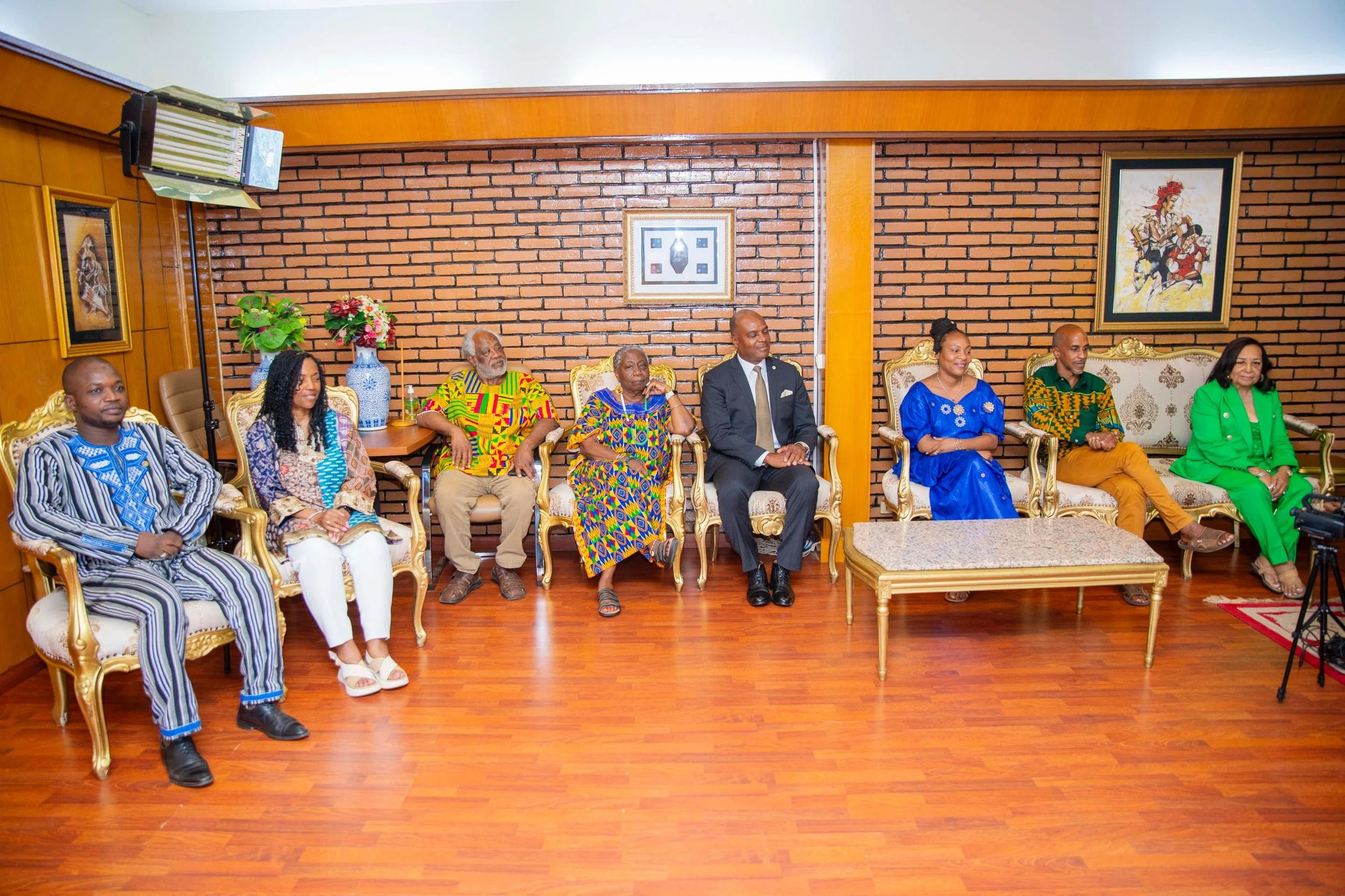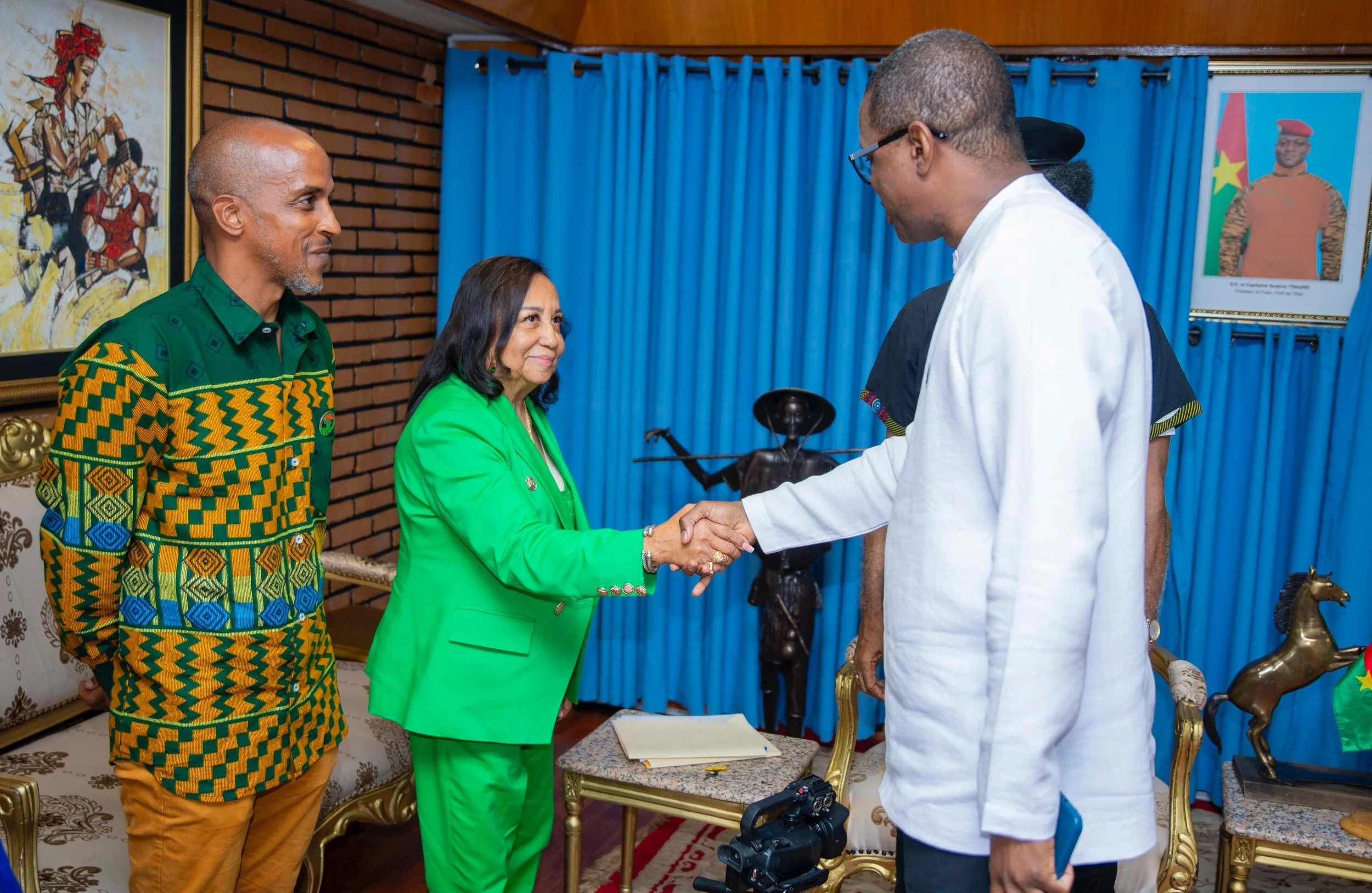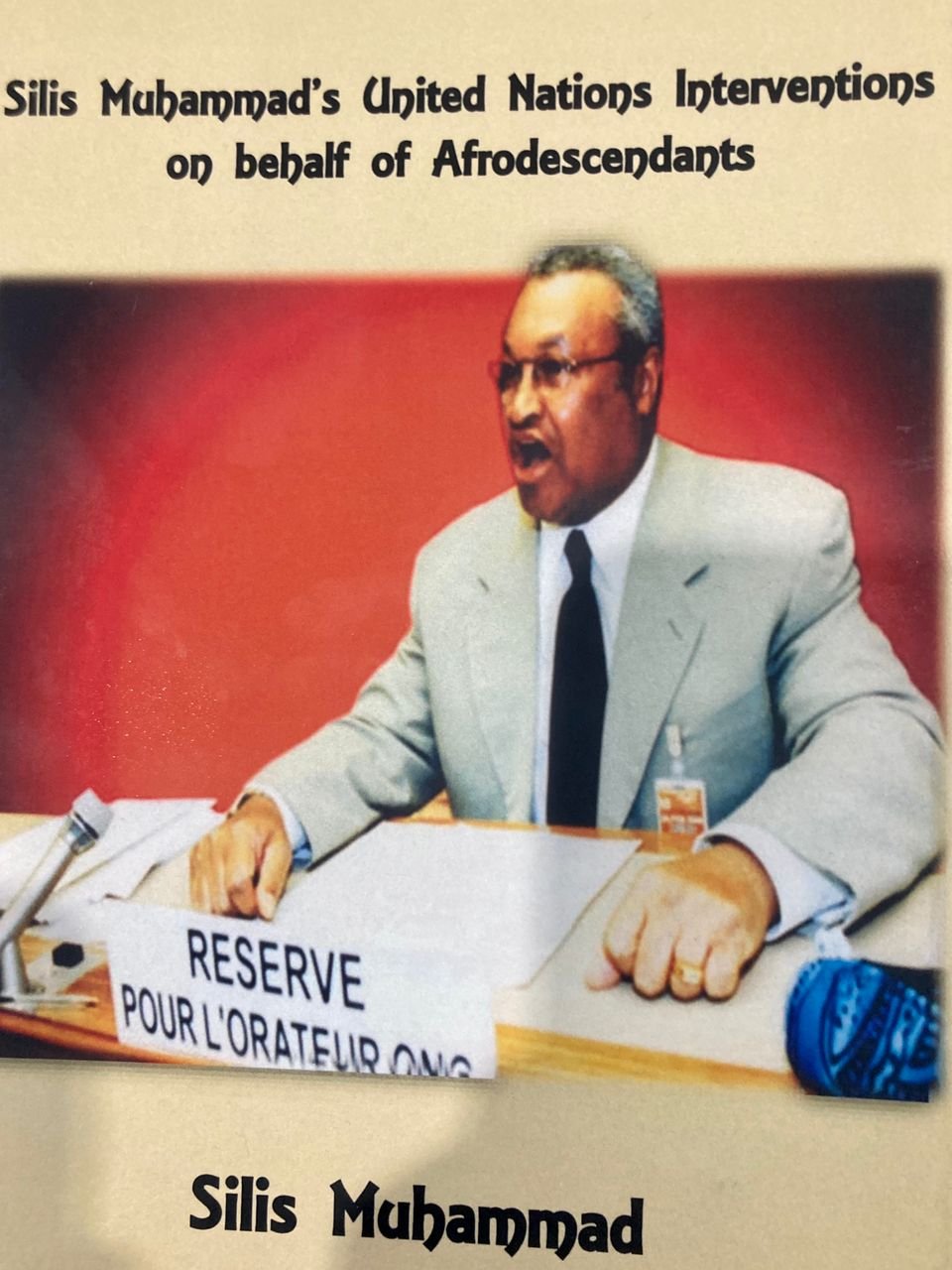-
July 2025
- Jul 15, 2025 ARCHIVE Jul 15, 2025
- Jul 15, 2025 NEW! CITIZENSHIP UPDATE FOR GUINEA BISSAU, BURKINA FASO AND BENIN Jul 15, 2025
- Jul 10, 2025 Next Steps Following Historic Mission of the Friends of President Ibrahim Traoré in the West Delegation Jul 10, 2025
- Jul 2, 2025 BLACK INDEPENDENCE DAY LIVE INTERNATIONAL BROADCAST JULY 4 Jul 2, 2025
- Jul 2, 2025 Honoring the Father of the United Nations Permanent Forum on People of African Descent (PFPAD): Silis Muhammad and His Interventions On Behalf of Afrodescendant Self Determination Jul 2, 2025
-
June 2025
- Jun 27, 2025 Friends of President Ibrahim Traoré in the West Delegation Meets with the President of the Commission for the Alliance of Sahel States Jun 27, 2025
- Jun 26, 2025 Friends of President Ibrahim Traoré in the West Delegation Begins Successful Mission in Burkina Faso Jun 26, 2025
- Jun 16, 2025 BLACK SUMMER 2025: DECLARATION OF SELF-DETERMINATION FOR NEW AFRIKAN AND AFRODESCENDANT PEOPLES Jun 16, 2025
- Jun 11, 2025 Another Member of the Balanta Society in America Returns to Guinea Bissau and Receives Passport Jun 11, 2025
- Jun 10, 2025 NCOBRA International Affairs Commission Hosts Workshop on REPARATIONS, DECOLONIZATION AND SELF DETERMINATION: SPOTLIGHT ON THE VIRGIN ISLANDS, BONAIRE AND ST MAARTE Jun 10, 2025
- Jun 6, 2025 What Role for the Afro Descendants in the African Union's Commission for International Law (AUCIL) and the Proposed Legal Reference Group? The Case of the Republic of New Afrika Jun 6, 2025
-
May 2025
- May 30, 2025 Pan African Treaty of the Sixth Region African Diaspora: Burkina Faso Collective Note Naming Siphiwe Baleka Special Envoy May 30, 2025
- May 29, 2025 AU ECOSOCC DIASPORA CONSULTATIONS CONTINUE TO DISAPPOINT AFRODESCENDANTS IN THE AU 6TH REGION May 29, 2025
- May 18, 2025 Afro Descendants Receive Their Passports in Guinea Bissau; African Commission on Human and Peoples' Rights Commends President of Guinea Bissau for Recognizing Afro Descendants' Right to Return May 18, 2025
- May 10, 2025 Afrodescendents’ DNA Testing, Right of Return and Plebiscites Claims Presented at the 83rd Ordinary Session of the African Commission on Human and Peoples' Rights May 10, 2025
-
April 2025
- Apr 30, 2025 REPUBLIC OF NEW AFRIKA MINISTER OF FOREIGN AFFAIRS DELIVERS LETTER TO U.S. GENERAL MICHAEL LANGLEY AT THE UNITED STATES LIASON OFFICE OF THE AMERICAN EMBASSY IN GUINEA BISSAU. Apr 30, 2025
- Apr 25, 2025 SEND THE PEOPLE'S REPRESENTATIVE TO THE AFRICAN COMMISSION ON HUMAN AND PEOPLES' RIGHTS AND TO THE VATICAN TO FIGHT FOR REPARATIONS Apr 25, 2025
- Apr 22, 2025 THE NEW NARRATIVE FOR THE AFRICAN UNION'S THEMED YEAR "REPARATIONS FOR AFRICANS AND PEOPLE OF AFRICAN DESCENT THROUGH REPARATIONS" Apr 22, 2025
- Apr 20, 2025 Rastafari, Repatriation and Citizenship Case Study in Tanzania: Mzee Saburi Omega, the Face of The Right To Return During the African Union's Themed Year "Reparations". Apr 20, 2025
- Apr 19, 2025 Exciting News: Pan African Treaty of the Sixth Region African Diaspora is FINALISED! Apr 19, 2025
- Apr 18, 2025 Discussing Decolonization and liberation with Russ Christopher, activist and freedom fighter in the U.S. Virgin Islands Apr 18, 2025
- Apr 9, 2025 Making A Reparations Claim Under the Geneva Convention for the Crime of Ethnocide Resulting from Enslavement Apr 9, 2025
-
March 2025
- Mar 22, 2025 Siphiwe Baleka Recommends Groundbreaking DNA Testing, Lineage Restoration, Repatriation and Self Governing Territories to Illinois' African Descent-Citizens Reparations Commission Mar 22, 2025
- Mar 19, 2025 EIN Presswire Refuses to Distribute Press Release about Plebiscite for Reparations for Afro Descendants Mar 19, 2025
- Mar 19, 2025 WHERE TO HOST A PAN AFRICAN CONGRESS? THE WAY FORWARD Mar 19, 2025
- Mar 17, 2025 REVISITING THE CONFERENCE ON THE PAN-AFRICANIST MOVEMENT IN AFRICA TODAY: SIPHIWE BALEKA DISCUSSES THE DIVISIONS IN THE MOVEMENT Mar 17, 2025
- Mar 17, 2025 Decade of Return to Guinea Bissau May 10-19, 2025 Mar 17, 2025
- Mar 12, 2025 AFRICAN DIASPORA 6TH REGION SANKOFA UBUNTU: THE RIGHT-NOW UNIFICATION MOMENT Mar 12, 2025
- Mar 12, 2025 AFRICAN DIASPORA 6TH REGION UBUNTU COALITION FOR ENGAGING IN THE AU THEME OF THE YEAR Mar 12, 2025
-
February 2025
- Feb 28, 2025 A Response to Tadesse Simie Metekia's article, AU ‘Year of Reparations’ should look to the future and the past Feb 28, 2025
- Feb 20, 2025 AU ECOSOCC and the African Diaspora 6th Region: Reflections on My Crusade While Returning from the 38th Ordinary Session of the Assembly of Heads of States and Governments of the African Union Feb 20, 2025
- Feb 6, 2025 GUINEA BISSAU GRANTS CITIZENSHIP TO TEN MORE AFRO DESCENDANTS Feb 6, 2025
-
January 2025
- Jan 20, 2025 SIPHIWE BALEKA SPEAKS ABOUT THE ONGOING LEGACY OF THE BERLIN CONFERENCE AT THE COOPERATIVE REPAIR EVENT Jan 20, 2025
- Jan 16, 2025 GUINEA BISSAU GRANTS CITIZENSHIP TO AFRICAN DIASPORA Jan 16, 2025
-
December 2024
- Dec 12, 2024 Bureaucrats, Gatekeepers and the Attempt to Sabotage the African Diaspora 6th Region Elections Dec 12, 2024
- Dec 1, 2024 African Diaspora Town Hall Meeting With Former Special Advisor to AU-ECOSOCC Ms. Evelyn Joe - "Variance between AU Member States' and AU's Definition of the Diaspora" Dec 1, 2024
-
November 2024
- Nov 17, 2024 TOWN HALL MEETING SUCCESSFULLY LAUNCHES ELECTIONS PROCESS FOR AFRICAN DIASPORA REPRESENTATIVES TO THE AU-ECOSOCC 4TH GENERAL ASSEMBLY Nov 17, 2024
- Nov 12, 2024 ELECTING THE AFRICAN DIASPORA/AU 6TH REGION REPRESENTATIVES FOR THE AFRICAN UNION ECONOMIC SOCIAL AND CULTRAL COUNCIL (AU-ECOSOCC) Nov 12, 2024
- Nov 8, 2024 PGRNA MINISTRY OF FOREIGN AFFAIRS MESSAGE TO BLACK PEOPLE IN AMERICA FOLLOWING THE ELECTION OF DONALD TRUMP TO THE OFFICE OF THE PRESIDENCY OF THE UNITED STATES OF AMERICA Nov 8, 2024
-
October 2024
- Oct 22, 2024 CONSULTATIVE MEETING HELD WITH CHAIR OF WORKING GROUP ON INDIGENOUS POPULATIONS AND MINORITIES IN AFRICA Oct 22, 2024
- Oct 21, 2024 BALANTA SOCIETY PRESIDENT ADVOCATES FOR AFRICAN DIASPORA RIGHT OF RETURN AT 81ST SESSION OF THE AFRICAN COMMISSION FOR HUMAN AND PEOPLES’ RIGHTS Oct 21, 2024
- Oct 6, 2024 Haitian Leader Jimmy "Barbecue" Chérizier speaks with the Minister of Foreign Affairs of the Provisional Government of the Republic of New Afrika Oct 6, 2024
-
September 2024
- Sep 29, 2024 NCOBRA Internation Affairs Commission Quarterly Zoom: PGRNA Minister of Foreign Affairs and BBHAGSIA President Discusses The Role of the African Union and Reparations Sep 29, 2024
- Sep 20, 2024 Balanta Basketball Star From America Plays First Game in Guinea Bissau Sep 20, 2024
- Sep 1, 2024 BBHAGSIA Member Joshua Roberts gets five year residency in Guinea Bissau Sep 1, 2024
-
August 2024
- Aug 13, 2024 FIDDLER AND CHICKEN GEORGE THEN AND NOW: CAN THE AFRICAN AMERICAN CELEBRITY CHANGE THE GAME? Aug 13, 2024
-
July 2024
- Jul 20, 2024 BALANTA LEADERS SPEAK ON THE HISTORY AND IMPORTANCE OF NEW AFRIKAN FOREIGN RELATIONS Jul 20, 2024
- Jul 12, 2024 The Republic of New Afrika Returns to the African Union for Diaspora Day Jul 12, 2024
-
June 2024
- Jun 21, 2024 Balanta Leaders Present at Juneteenth Commemoration Highlighting the Need for Reparatory Justice Jun 21, 2024
- Jun 14, 2024 Republic of New Afrika Minister of Foreign Affairs on RealTalk: History as a Weapon for Black Liberation, Black Power Media Network podcast Jun 14, 2024
- Jun 9, 2024 The Correctness of Shifting from the European "Slave Trade" to the African "War Crimes" Narrative: Notes on José Lingna Nafafé's New Book on the 1684 Mendonça (Kongo) Reparations Case at the Vatican Jun 9, 2024
-
May 2024
- May 29, 2024 ARE BLACK PEOPLE IN AMERICA STILL PRISONERS OF WAR IF THEY HAVE VOTED? May 29, 2024
- May 27, 2024 WORLD AQUATICS AND THE GUINEA BISSAU NATIONAL OLYMPIC COMMITTEE: FRAUD, THEFT, DISCRIMINATION & CORRUPTION - ILLEGAL PAYMENTS!!!! May 27, 2024
- May 27, 2024 PGRNA Minister of Foreign Affairs Siphiwe Baleka discussed the UN Permanent Forum and the Request for an Advisory Opinion from the ICJ on the 𝑹𝒆𝒑𝒂𝒓𝒂𝒕𝒊𝒐𝒏𝒔 𝑵𝒐𝒘 podcast May 27, 2024
- May 19, 2024 The Minister of Foreign Affairs of the Provisional Government of the Republic of New Afrika addressed the Afrodescendant Nation National Reparations Convention in Washington, D.C. May 19, 2024
- May 9, 2024 Republic of New Afrika Minister of Foreign Affairs Siphiwe Baleka Concludes Successful Diplomacy Tour in Ougadougu, Burkina Faso May 9, 2024
-
April 2024
- Apr 27, 2024 IS THE UN PERMANENT FORUM ON PEOPLE OF AFRICAN DESCENT THE LATEST REFINEMENT OF SCIENTIFIC COLONIALISM? Apr 27, 2024
- Apr 27, 2024 Republic of New Afrika: Overview of National Security Apr 27, 2024
- Apr 27, 2024 Analysis by the Republic of New Afrika of Legal Issues Requiring an Advisory Opinion from the International Court of Justice Apr 27, 2024
- Apr 26, 2024 THE POLITICAL-LEGAL HISTORY OF THE REPUBLIC OF NEW AFRIKA AND THE WAR WAGED AGAINST IT BY THE UNITED STATES OF AMERICA Apr 26, 2024
- Apr 26, 2024 Provisional Government of the Republic of New Afrika Statement to the Permanent Forum on People of African Descent Apr 26, 2024
- Apr 14, 2024 EARTH DAY 53: WITCHCRAFT, THE NEW AFRIKAN THREAT TO US NATIONAL SECURITY AND THE MERCY OF DESTINY Apr 14, 2024
-
March 2024
- Mar 25, 2024 BBHAGSIA Dafana Institute Quebo Project Update Mar 25, 2024
- Mar 16, 2024 DEFENDING THE INTERIM PROVISIONAL GOVERNMENT OF THE REPUBLIC OF NEW AFRIKA DURING THE SPECIAL ELECTION Mar 16, 2024
- Mar 11, 2024 The United Nations Permanent Forum of People of African Descent (PFPAD) 3rd Forum Denies Sponsorship for AfroDescendant Activist Requesting Advisory Opinion from the ICJ Mar 11, 2024
-
February 2024
- Feb 26, 2024 Provisional Government of the Republic of New Afrika Advises African Union Legal Reference Group Feb 26, 2024
- Feb 9, 2024 A Balanta Homecoming: Abebenan Visits Tchokmon Village In Guinea Bissau Feb 9, 2024
- Feb 3, 2024 The Interim Provisional Government of the Republic of New Afrika Applies to Renew Observer Status at the African Union Feb 3, 2024
-
January 2024
- Jan 25, 2024 ISLAMIC FUNDAMENTALIST TERRORISM COMES TO BALANTA PEOPLE IN TINKA VILLAGE, BISSORA SECTOR, OIO REGION, NORTHERN GUINEA BISSAU Jan 25, 2024
- Jan 4, 2024 A Matter of War: Imari Obadele, Our Enslavement in the 13 Colonies and the United States, the Republic of New Afrika and Reparations Jan 4, 2024
- Jan 1, 2024 Plebiscite Workshop at the New Afrikan People's Convention, December 30, 2023 Jan 1, 2024
- Jan 1, 2024 WILL 2024 BE THE YEAR OF PAN AFRICAN ORGANIZATIONAL UNITY?: THE UNFINISHED BUSINESS OF THE PAN AFRICAN CONGRESS Jan 1, 2024
-
December 2023
- Dec 16, 2023 Siphiwe Baleka and Kamm Howard: Notes on Reparations & Plebiscite Strategy Dec 16, 2023
-
November 2023
- Nov 28, 2023 STOP CALLING IT A SLAVE TRADE: YOUR ANCESTORS WERE PRISONERS OF WAR! NKECHI TAIFA REFLECTS ON THE TEACHINGS OF IMARI OBADELE Nov 28, 2023
- Nov 23, 2023 Balanta Society Report from the Accra Reparations Conference, November 14-17, 2023 Nov 23, 2023
- Nov 22, 2023 Input on the Request for an Advisory Opinion from the International Court of Justice on the Status of Afro Descendants Under the Geneva Convention Nov 22, 2023
- Nov 15, 2023 WHO IS AN AFRICAN EXPERT ON REPARATIONS? Nov 15, 2023
- Nov 4, 2023 What Real Reparations Looks Like: A Visit to the Balanta Village in Rucuto, Guinea Bissau Nov 4, 2023
-
October 2023
- Oct 17, 2023 United States Confronted About State-Sanctioned Ethnocide Against Balanta People at the United Nations Oct 17, 2023
- Oct 10, 2023 A Letter Urging PFPAD President Epsy Campbell Bar to Immediately Fulfill the Mandate Given by Civil Society to Request an Advisory Opinion from the International Court of Justice Oct 10, 2023
-
September 2023
- Sep 26, 2023 ILLINOIS STATE REPRESENTATIVE CAROL AMMONS AND BBHAGSIA PRESIDENT SIPHIWE BALEKA DISCUSS AFRICAN AMERICAN PRISONER OF WAR STATUS, ETHNOCIDE AND THE PLEBISCITE FOR SELF DETERMINATION Sep 26, 2023
- Sep 25, 2023 BBHAGSIA President Siphiwe Baleka Presents at the Future Black America Conference, September 19 Sep 25, 2023
- Sep 7, 2023 Nkechi Taifa's Human Rights and Justice Podcast: Episode 52 Featuring Siphiwe Baleka Sep 7, 2023
- Sep 7, 2023 Decade of Return to Guinea Bissau Coordinator Siphiwe Baleka meets with the New Minister of Tourism, Faustino Mamadu Saliu Jaló Sep 7, 2023
- Sep 2, 2023 Siphiwe Baleka, President of the Guinea Bissau Swimming Federation meets with the new Minister of Justice and Human Rights, Mr. Albino Gomes Sep 2, 2023
- August 2023
-
July 2023
- Jul 28, 2023 Endorse the N’COBRA Health Commission Millions for Mutulu: The Dr. Mutulu Shakur Public Health Peoples Campaign Jul 28, 2023
- Jul 28, 2023 Tanya, Susana & the Djola (aka Felupe) Essangai: A Story for the Lineage Restoration Council of Guinea Bissau Jul 28, 2023
- Jul 25, 2023 PFPAD President Epsy Campbell Barr’s Official Response to the Mandate Requesting an ICJ Advisory Opinion. Jul 25, 2023
- Jul 21, 2023 UPDATE: Siphiwe Baleka to Address U.S. State Department on Balanta in America Self Determination and Right to Return to Guinea Bissau Jul 21, 2023
- Jul 20, 2023 READ THE PETITION CHARGING THE UNITED STATES WITH ETHNOCIDE THAT WAS DISMISSED BY THE INTER AMERICAN COMMISSION ON HUMAN RIGHTS Jul 20, 2023
- Jul 16, 2023 “Petty Theft” or “Special Op”? Office of Reparations Activist Burglarised, Laptops Stolen Jul 16, 2023
-
June 2023
- Jun 28, 2023 PFPAD President Epsy Campbell Bar Agrees to sign a Request for an Advisory Opinion from the International Court of Justice on the Status of Afro Descendants Enslaved in the Americas. Jun 28, 2023
- Jun 26, 2023 ENDORSE THE 8TH PAN AFRICAN CONGRESS PART 1 TO BE HELD LATER THIS YEAR IN HARARE, ZIMBABWE Jun 26, 2023
- Jun 22, 2023 Siphiwe Baleka to Address U.S. State Department on Balanta in America Self Determination and Right to Return to Guinea Bissau Jun 22, 2023
- Jun 20, 2023 JUNETEENTH: THE LINCOLN ADMINISTRATION'S RECOGNITION OF NEW AFRIKAN RIGHTS UNDER NATURAL AND INTERNATIONAL LAW, THE 14TH AMENDMENT FRAUD & THE UNFINISHED BUSINESS OF MALCOLM X AND IMARI OBADELE Jun 20, 2023
- Jun 19, 2023 Balanta Basketball Star from America Arrives in Guinea Bissau during the Decade of Return Jun 19, 2023
- Jun 15, 2023 8PAC1 Conversations: Reparations Reverend Kwame Kamau and Siphiwe Baleka discuss Pan Africanism, Lineage Restoration and PFPAD Jun 15, 2023
- Jun 10, 2023 Direct and Certain Causal Nexus: Reparatory Justice for Quantifiable Harms and The Importance of the PFPAD Mandate to Request an Advisory Opinion from the International Court of Justice (ICJ) Jun 10, 2023
- Jun 8, 2023 1st Meeting of the Lineage Restoration Council of Guinea Bissau Jun 8, 2023
- Jun 8, 2023 Will Siphiwe Baleka and the Guinea Bissau Swimming Federation be Blocked from the Olympics Again? Jun 8, 2023
- Jun 2, 2023 AN OPEN LETTER TO EPSY CAMPBELL BARR IMMEDIATELY FOLLOWING THE CLOSE OF THE 2ND SESSION OF THE PERMANENT FORUM ON PEOPLE OF AFRICAN DESCENT Jun 2, 2023
- Jun 2, 2023 Webinar: I made $100 in my first month posting on the Backroom social media platform - the "Black Facebook". Here's how I did it. Saturday, June 10 at 1:00 pm CST Jun 2, 2023
-
May 2023
- May 31, 2023 Justin Hansford's Remarks at the Opening of the Permanent Forum on People of African Descent (PFPAD) May 31, 2023
- May 30, 2023 Statement to the 2nd Session of PFPAD: Mandate to Request an Advisory Opinion from the ICJ May 30, 2023
- May 29, 2023 8PAC1 Conversations: Curtis Murphy on the Fihankra Repatriation and CIA Sabotage May 29, 2023
- May 28, 2023 The Unfinished Business of Malcolm X and Imari Obadele: Taking Our Claim to the International Court of Justice May 28, 2023
- May 25, 2023 ILLINOIS PASSES HR292 RESOLUTION TO PROVIDE DNA TESTING AND REPARATIONS FOR VOLUNTARY REPATRIATION TO ANCESTRAL HOMELANDS IN AFRICA - HIGHLIGHTS BALANTAS FROM AMERICA May 25, 2023
- May 1, 2023 MoAC Biss – Art and Culture Exhibition of Guinea-Bissau May 2023 May 1, 2023
- May 1, 2023 Balanta Society Statement to the 32nd Session of the Working Group of Experts on People of African Descent Economic Empowerment of People of African Descent Geneva, Switzerland, May 1-5, 2023 May 1, 2023
-
April 2023
- Apr 27, 2023 Siphiwe Baleka to Present at International Congress entitled “OTHER READINGS ABOUT AMÍLCAR CABRAL” at the University of Lisbon, April 27 and 28th Apr 27, 2023
- Apr 26, 2023 Human Rights and Justice with host Nkechi Taifa: Episode 34 - "Reparations Utilizing International Instruments with Siphiwe Balenta" Apr 26, 2023
- Apr 17, 2023 Global Afrikan Strategic Reparatory Justice Efforts at the PFPAD, ICJ, and AU - The Board As Seen By Siphiwe Baleka Apr 17, 2023
- Apr 13, 2023 WEWO! Nqpadn Kbonh Issue #1 Apr 13, 2023
- Apr 4, 2023 Prince Theophilus Tatsitsa Gha and Siphiwe Baleka Discuss the Decade of Return Initiative in Cameroon Apr 4, 2023
-
March 2023
- Mar 31, 2023 Don't Be Fooled! The Vatican's Statement on the Doctrine of Discovery is Wordplay! Mar 31, 2023
- Mar 26, 2023 Introducing Alante Daniel Nabicamba Mar 26, 2023
- Mar 25, 2023 5th Preparatory Meeting for the 8th Pan African Congress Part 1: Definition of the Diaspora Mar 25, 2023
- Mar 19, 2023 Supporting the 8th Pan African Congress Part 1: Letters to Africans at Home and Abroad from the Council of Pan African Diaspora Elders Mar 19, 2023
- Mar 9, 2023 Council of Pan African Diaspora Elders forms to support the 8th Pan African Congress Part 1 to be held in Harare, Zimbabwe Mar 9, 2023
- Mar 8, 2023 BBHAGSIA President Siphiwe Baleka Presents "Ethnocide: Genocide's Twin Sister" at the 9th Annual Genocide and Human Rights Research Conference Mar 8, 2023
- Mar 5, 2023 Taking the Afro Descendants Case to the International Court of Justice: A Peoples' Mandate Issued to the Permanent Forum on People of African Descent Mar 5, 2023
-
February 2023
- Feb 14, 2023 Letter to Pan Africanists Concerning the Upcoming Pan African Congress in Harare, Zimbabwe Later This Year Feb 14, 2023
- Feb 13, 2023 From the 8th Pan African Congress in 2014 to the 8th Pan African Congress in 2023 Feb 13, 2023
- Feb 9, 2023 Will there be an African Diaspora regional headquarters for the African Union 6th Region? Upcoming Pan African Congress to make a proposal Feb 9, 2023
- Feb 9, 2023 African Diaspora Ambassadors for the African Union 6th Region: Upcoming Pan African Congress to Make Proposal Feb 9, 2023
- Feb 8, 2023 Upcoming Pan African Congress in Harare, Zimbabwe Will Propose a Comprehensive African Union Citizenship Policy for the African Diaspora Feb 8, 2023
-
January 2023
- Jan 22, 2023 Call for Inputs for United Nations Visit to the United States of America 24 April – 5 May 2023 Jan 22, 2023
- Jan 18, 2023 Balanta Society in America President Siphiwe Baleka Discusses the Durban Declaration at Forum on the 7th National Day of Racial Healing Jan 18, 2023
- Jan 15, 2023 Peanuts, Cashews, Mono-Mercantilism, and Soil Erosion in Guinea Bissau: Amilcar Cabral and George Washington Carver Jan 15, 2023
-
December 2022
- Dec 26, 2022 UN Working Group of Experts on People of African Descent Intervenes in Mumia Abu Jamal's Case Dec 26, 2022
- Dec 20, 2022 Guinea Bissau Citizenship Update: Important Meeting With Conservador dos Registros Centrais (Keeper of Central Records) Dec 20, 2022
- Dec 19, 2022 Strategic Reparations Litigation: Transgenerational Epigenetic Effects, Ethnocide and Prisoner of War Claims - A Look at Cases Against France and the United States Dec 19, 2022
- Dec 14, 2022 Baba Dr. Wade Ifágbemì Sàngódáre Nobles and Siphiwe Baleka Discuss Transgenerational Epigentic Effects (TGEE) of Slavery and Divine Energy Made Manifest (DEMM) Dec 14, 2022
- Dec 12, 2022 NCOBRA's Statement to the Permanent Forum on People of African Descent Dec 12, 2022
- Dec 8, 2022 New! Guinea Bissau Citizenship Update Dec 8, 2022
- Dec 6, 2022 Siphiwe Baleka Statement to the 1st Session of the UN Permanent Forum on People of African Descent Dec 6, 2022
- Dec 1, 2022 THE PERMANENT FORUM ON PEOPLE OF AFRICAN DESCENT, THE DURBAN DECLARATION, REPATRIATION AND PLEBISCITE FOR SELF DETERMINATION Dec 1, 2022
-
November 2022
- Nov 29, 2022 2022 Decade of Return Naming Ceremony in Guinea Bissau for Members of the Balanta B'urassa History & Genealogy Society in America Nov 29, 2022
- Nov 17, 2022 The Indignity of an African Traveling to Geneva, Switzerland for the Launch of the Permanent Forum of People of African Descent at the United Nations Nov 17, 2022
- Nov 13, 2022 WILL CAMEROON SEIZE THE MOMENT TO GIVE CITIZENSHIP TO PEOPLE OF CAMEROONIAN ORIGIN IN THE DIASPORA UNDER A DECADE OF RETURN TO CAMEROON INITIATIVE Nov 13, 2022
- Nov 6, 2022 Decade of Return to Cameroon: Report on the African Roots and Heritage Foundation and our Meeting with the Cameroon Ministry of External Affairs Nov 6, 2022
- Nov 5, 2022 THE NEW AFRIKAN THOUGHT CONFERENCE IN YAOUNDE, CAMEROON HOSTED BY THE INTERNATIONAL RESEARCH AND DOCUMENTATION CENTER ON AFRICAN TRADITIONS AND LANGUAGES (CERDOTOLA) Nov 5, 2022
-
October 2022
- Oct 26, 2022 New Afrikan Consciousness vs. New African Thought: Mysticism in the Age of Artificial Intelligence Oct 26, 2022
- Oct 15, 2022 NEW AFRIKAN INDEPENDENCE MOVEMENT AND HUMAN RIGHTS: Statement to the 20th session of the UN Intergovernmental Working Group on the Effective Implementation of the Durban Declaration Oct 15, 2022
- September 2022
-
August 2022
- Aug 27, 2022 MY CONVERSATION WITH MALCOLM X Aug 27, 2022
- Aug 20, 2022 BBHAGSIA Founder Siphiwe Baleka discusses neo-colonialism, organizing, global soil extinction and revolutionary Pan Africanism with Omowale Afrika on the "Going Off Topic" Podcast Aug 20, 2022
- Aug 20, 2022 What Direction Reparations? - Article from the NCOBRA 33rd Annual Convention Aug 20, 2022
- Aug 8, 2022 BBHAGSIA Celebrates Inaugural Dr. Mutulu Shakur Community Health Day With 4 Minute Fit Program Aug 8, 2022
- July 2022
-
June 2022
- Jun 24, 2022 TOWARDS A PLEBISCITE FOR SELF DETERMINATION OF THE AFRO DESCENDANT COLONY IN THE UNITED STATES: AN IMARI OBADELE READER AND STRATEGIC PLAN Jun 24, 2022
- Jun 15, 2022 UNDERSTANDING THE SPORTS LANDSCAPE IN GUINEA BISSAU AND A PLAN TO FIX IT Jun 15, 2022
- Jun 13, 2022 RUMO A UMA POLÍTICA DE DIREITO DE RETORNO E CIDADANIA PARA OS DESCENDENTES DE PESSOAS RETIRADAS DE TERRITÓRIOS DA ÁFRICA DURANTE O TRÁFICO TRANSATLÂNTICO E ESCRAVIDÃO DE POVOS AFRICANOS Jun 13, 2022
- Jun 9, 2022 TOWARDS A RIGHT TO RETURN & CITIZENSHIP POLICY FOR DESCENDENTS OF PEOPLE TAKEN FROM TERRITORIES IN AFRICA DURING THE TRANSATLANTIC TRAFFICKING AND ENSLAVEMENT OF AFRICAN PEOPLE Jun 9, 2022
- Jun 7, 2022 INTERNATIONAL SUPPORT FOR GUINEA BISSAU’S SWIMMERS: 1ST "DASH FOR CASH" EVENT AND ELITE TEAM SELECTION Jun 7, 2022
- Jun 2, 2022 NATAÇÃO, DINHEIRO E DESIGUALDADE GLOBAL: UMA COMPARAÇÃO DO APOIO DADO À FEDERAÇÃO DE NATAÇÃO DA GUINÉ BISSAU E À FEDERAÇÃO DE NATAÇÃO DA UCRÂNIA Jun 2, 2022
- Jun 2, 2022 SWIMMING, MONEY AND GLOBAL INEQUALITY: A COMPARISON OF SUPPORT GIVEN TO THE GUINEA BISSAU SWIMMING FEDERATION AND THE UKRAINE SWIMMING FEDERATION Jun 2, 2022
- Jun 2, 2022 AT LOOK AT THE STRUGGLE TO BRING COMPETITIVE SWIMMING TO GUINEA BISSAU Jun 2, 2022
-
May 2022
- May 22, 2022 CURRENT STATUS OF GUINEA BISSAU: A REVIEW OF RELEVANT STATISTICS May 22, 2022
- May 6, 2022 BBHAGSIA Founder Siphiwe Baleka Promoting the Global #savesoil movement in Guinea Bissau May 6, 2022
-
April 2022
- Apr 20, 2022 BBHAGSIA President Siphiwe Baleka Joins Launch of the Impact Hub Candidate Bissau Apr 20, 2022
- Apr 2, 2022 Team SDGB Celebrates Birthday of Guinea Bissau Swimming Federation Interim President Siphiwe Baleka Apr 2, 2022
-
March 2022
- Mar 25, 2022 Decade of Return to Guinea Bissau November 22-29, 2022 Mar 25, 2022
- Mar 8, 2022 Balanta History & Genealogy Society in America Launches T-Shirt Collection Featuring The Teachings of Amilcar Cabral Mar 8, 2022
-
February 2022
- Feb 6, 2022 RIGHT TO RETURN ALLIANCE SKILLS SURVEY Feb 6, 2022
- Feb 6, 2022 FIRST 50-METER OLYMPIC SWIM TRAINING FACILITY BUILT IN GUINEA BISSAU Feb 6, 2022
- January 2022
-
November 2021
- Nov 18, 2021 BBHAGSIA President Discusses the COVID Agenda on Discussions of Truth Podcast Nov 18, 2021
- Nov 8, 2021 Nbuntul a Kraase: Balanta Stories Now Available for First Time Translated into English Nov 8, 2021
- Nov 2, 2021 BanFaaba and BBHAGSIA Presidents Attend African Union Workshop on Transformational Leadership Across Africa Nov 2, 2021
-
October 2021
- Oct 23, 2021 Federação de Natação da Guiné-Bissau e Ban-Faaba comemoram o Dia Mundial da Natação Oct 23, 2021
- Oct 23, 2021 Guinea Bissau Swim Federation and Ban-Faaba Celebrate World Swim Day Oct 23, 2021
- Oct 20, 2021 Setting an Example for Afrodescendant Athletes From America: Siphiwe Baleka Represents Guinea Bissau at the 14th African Swimming Championships Oct 20, 2021
- Oct 14, 2021 O presidente do BanFaaba, Mario Ceesay, e o coordenador da Década de Retorno, Siphiwe Baleka, se encontram com H.E. Dra. Erieka Bennett, Fundadora e Chefe da Missão, Diáspora Fórum Africano Oct 14, 2021
- Oct 14, 2021 BanFaaba President Mario Ceesay and Decade of Return Coordinator Siphiwe Baleka Meet with H.E. Dr. Erieka Bennett, Founder and Head of Mission, Diaspora African Forum Oct 14, 2021
- Oct 13, 2021 MOTION TO THE AFRICAN UNION EXECUTIVE COUNCIL 39th EXTRAORDINARY SESSION DRAFTED BY BBHAGSIA PRESIDENT AND SUBMITTED TO THE AU ECOSOCC SECRETARIAT THROUGH THE ZAMBIAN MINISTER OF FOREIGN AFFAIRS Oct 13, 2021
- Oct 2, 2021 BBHAGSIA Member Joshua Roberts Playing Professional Basketball and Lighting It Up at the Armenia Cup. Oct 2, 2021
-
September 2021
- Sep 22, 2021 Consulting a B'sika and Discovering Unche, My Ancestral Village in Guinea Bissau Sep 22, 2021
- Sep 15, 2021 BAN-FAABA USA Donates Medical Supplies to Village in Encheia, Guinea Bissau Sep 15, 2021
- Sep 9, 2021 THE CALL TO ORGANIZE BALANTA PEOPLE WORLDWIDE: BRASSA MADA N’SAN KEHENLLI BAM’FABA – MESSAGE #4 Sep 9, 2021
-
July 2021
- Jul 21, 2021 A Bumpy Road to the Olympics - Training in Guinea Bissau Jul 21, 2021
- Jul 18, 2021 Decade of Return to Guinea Bissau November 23-30, 2021 Jul 18, 2021
-
June 2021
- Jun 22, 2021 ANNOUNCEMENT FROM THE GOVERNMENT OF GUINEA BISSAU TO AFRODESCENDANTS IN THE UNITED STATES CONCERNING THE DECADE OF RETURN Jun 22, 2021
- Jun 11, 2021 Guinea Bissau Begins Granting Citizenship to Afrodescendants from the United States Jun 11, 2021
- Jun 2, 2021 Afrodescendant Steering Committee Questionnaire for Organizational Leaders Jun 2, 2021
-
May 2021
- May 27, 2021 Decade of Return To Guinea Bissau 2023 May 27, 2021
-
April 2021
- Apr 26, 2021 Learning from Neely Fuller Jr. About Your Status as A Prisoner of War Under the System of White Supremacy Apr 26, 2021
- Apr 19, 2021 Afrodescendant Steering Committee Self Determination Survey Apr 19, 2021
- Apr 17, 2021 UPDATED: Africa Day 2021 Decade of Return to Guinea Bissau, May 11-14, and June 8-11, 2021 Apr 17, 2021
- Apr 14, 2021 WOMEN'S HISTORY MONTH FEATURING BALANTA WOMEN: NICOLE VADEN Apr 14, 2021
- Apr 14, 2021 Learning From The Leaders The Personal Cost of African Liberation: Responsibility, Racial Re-Education, Spiritual Re-Conversion, and Class Suicide for a Holy Order of Commitment Apr 14, 2021
- Apr 7, 2021 WOMEN'S HISTORY MONTH FEATURING BALANTA WOMEN: TRIMECHIAH LYNETTE ROGERS Apr 7, 2021
- Apr 1, 2021 Women's History Month Featuring Balanta Women: Spectra Amanuri Apr 1, 2021
-
March 2021
- Mar 23, 2021 Balanta Kentohé Language Lessons Series 3 Now Available Mar 23, 2021
- Mar 21, 2021 Women's History Month Featuring Balanta Women: Jazzy Ellis Mar 21, 2021
- Mar 9, 2021 Women's History Month Featuring Balanta Women: Melanie "Duturna" Young Mar 9, 2021
- Mar 3, 2021 Will Guinea Bissau's "Decade of Return Initiative" Be the Next Big Boon For This Small African Nation? Mar 3, 2021
-
February 2021
- Feb 23, 2021 Guinea Bissau Officially Welcomes Descendants for Decade of Return Events in May and June Feb 23, 2021
- Feb 17, 2021 Editorial: A Stolen Legacy? - A Critical examination of Barak Obama Post Presidency, and his enduring impact on the collective Black Consciousness Feb 17, 2021
- Feb 12, 2021 BBHAGSIA Member Kamm Howard to Give Testimony at Reparations Hearing Feb 12, 2021
-
January 2021
- Jan 30, 2021 Guinea Bissau: Mbontol Fnhénhe (A Love Poem) Jan 30, 2021
- Jan 25, 2021 Afrodescendants' Response to President Biden's Executive Order On Advancing Racial Equity and Support for Underserved Communities Through the Federal Government Jan 25, 2021
- Jan 19, 2021 Siphiwe Baleka interviewd on NBC Access Daily, Friday January 15, 2021 Jan 19, 2021
- Jan 16, 2021 BBHAGSIA to Renovate Headquarters and Provide Olympic Training Center for Guinea Bissau Olympic Swim Team Jan 16, 2021
- Jan 15, 2021 Africa Day 2021 Decade of Return to Guinea Bissau, May 12-15, and June 7-10, 2021 Jan 15, 2021
- Jan 14, 2021 Naming Ceremony for Nine Members of the Balanta B'urassa History and Genealogy Society in America Jan 14, 2021
- Jan 12, 2021 Nqpadn kbonh (I have returned) Update for BBHAGSIA Members Sunday, January 17th at 5 pm CST Jan 12, 2021
-
December 2020
- Dec 10, 2020 STATEMENT ON BEHALF OF THE AFRODESCENDANT NATION WHO ARE DESCENDANTS OF AFRICANS ENSLAVED IN THE UNITED STATES (DAEUS) ON THE 72ND HUMAN RIGHTS DAY Dec 10, 2020
- Dec 9, 2020 BBHAGSIA President Presentation to the 1st Africa Diaspora Summit, Nairobi Kenya Dec 9, 2020
- Dec 7, 2020 BBHAGSIA Winter Celebration, Sunday, December 13 at 6:00 PM CST Dec 7, 2020
- Dec 4, 2020 BBHAGSIA President Siphiwe Baleka on the cover of Sports Illustrated Dec 4, 2020
-
November 2020
- Nov 23, 2020 BBHAGSIA President Addresses the Working Group of Experts on People of African Descent at the United Nations Nov 23, 2020
- Nov 22, 2020 BBHAGSIA President Conversation with the Pendo Center for Human Rights and Self-Determination Nov 22, 2020
- Nov 18, 2020 BBHAGSIA President attends session: Anti-Black racism and police brutality: HRDs’ expectations from the UNHRC Nov 18, 2020
- Nov 14, 2020 BBHAGSIA PRESIDENT ATTENDS SESSION OF THE AFRICAN PEER REVIEW MECHANISM (APRM) OF THE AFRICAN UNION Nov 14, 2020
-
October 2020
- Oct 15, 2020 Conversation Reparations With NCOBRA: Reparations thru Lineage Restoration Oct 15, 2020
- Oct 14, 2020 FIHANKRA CONTROVERSY: A CAUTIONARY TALE ABOUT REPATRIATION TO AFRICA AND DEVELOPMENT MODELS BASED ON BLACK CAPITALISM Oct 14, 2020
- Oct 14, 2020 BBHAGSIA 1st Annual Meeting Oct 14, 2020
- Oct 12, 2020 Gold and Oil: Petrodollars and the United States Attacks in Libya, Somalia, Sudan, Mali, Iraq, Syria, Lebanon and Iran; Understanding Obama’s AFRICOM Betrayal of African People Oct 12, 2020
- Oct 2, 2020 UNDERSTANDING THE ILLUSION OF DEMOCRACY, ESPECIALLY IN THE UNITED STATES Oct 2, 2020
-
September 2020
- Sep 24, 2020 BALANTA RESPONSE TO THE UNITED STATES SECRETARY OF STATE MIKE POMPEO ON THE 47TH GUINEA BISSAU INDEPENDENCE DAY Sep 24, 2020
- Sep 24, 2020 BALANTA POET SIMONE ROBERTS: WHO AM I? Sep 24, 2020
- Sep 24, 2020 Gambia Balanta Student Association Sep 24, 2020
- Sep 9, 2020 The Success of Reverend Charles Colcock Jones' Plan to Prevent Negro Insurrection: Christian Mental Slavery & The Family of Jacob Blake Sep 9, 2020
-
August 2020
- Aug 24, 2020 STATEMENT ON THE SHOOTING OF JACOB BLAKE III, A BALANTA DESCENDANT, IN THE UNITED STATES Aug 24, 2020
- Aug 17, 2020 REPARATIONS: A REMINDER FROM 18 YEARS AGO. . . . Aug 17, 2020
- Aug 8, 2020 SPECIAL SCREENING OF FUNDI: THE STORY OF ELLA BAKER SUNDAY AT 6:00 PM CST Aug 8, 2020
- Aug 7, 2020 AU 6th Region Diaspora Initiative: History and Current Status with the AU 6th Region Education Campaign Director Aug 7, 2020
-
July 2020
- Jul 27, 2020 LINEAGE RESTORATION MOVEMENT Jul 27, 2020
- Jul 22, 2020 CLASH OF CULTURES: EXPLAINING THE RACIAL WEALTH GAP TO MY WIFE Jul 22, 2020
- Jul 6, 2020 INTERPRETING THE 14TH AMENDMENT: A CONVERSATION WITH A VETERAN OF THE BLACK LIBERATION LEGAL STRUGGLE Jul 6, 2020
-
June 2020
- Jun 28, 2020 Balanta B'urassa Founders Day: Celebrating Those Who Resist, August 1, 2020 Chicago, IL Jun 28, 2020
- Jun 27, 2020 Balanta Society in America Continues Food Distribution in Guinea Bissau Jun 27, 2020
- Jun 11, 2020 INTEGRATION (ELECTORAL POLITICS) VS. NATIONALISM (SELF DEFENSE) VS. REVOLUTION (BY ANY MEANS NECESSARY): UNDERSTANDING THE ART OF COOPTING BLACK LIBERATION Jun 11, 2020
- Jun 6, 2020 UNDERSTANDING MY BALANTA FATHER: A NEW INTERPRETATION OF THOSE WHO RESIST IN AMERICA Jun 6, 2020
- Jun 5, 2020 REPORT: BALANTA SOCIETY IN AMERICA AND BAM'FABA DISTRIBUTE FOOD IN SINTCHAM, TANDE AND SAMODJE VILLAGES IN NORTHERN GUINEA BISSAU Jun 5, 2020
- Jun 1, 2020 EXPLAINING TO MY COLORLESS (WHITE) FRIENDS THE SOLUTION TO THE AMERICAN PROBLEM AND ENDING THE CIVIL WAR THAT WAS ESCALATED BY THE MURDER OF GEORGE FLOYD Jun 1, 2020
-
May 2020
- May 30, 2020 INSTRUCTIONS FOR THE PROTECTION OF THE BLACK COMMUNITY AND PROTESTERS IN THE WAKE OF THE MURDER BY TORTURE OF GEORGE FLOYD. May 30, 2020
- May 27, 2020 REVISITING THE BLACK LIBERATION ARMY'S MESSAGE TO THE BLACK MOVEMENT IN RESPONSE TO THE KILLING OF GEORGE FLOYD May 27, 2020
- May 25, 2020 VIEWPOINTS OF THE ORIGINAL AMERICAN DESCENDANTS OF SLAVES (ADOS) May 25, 2020
- May 24, 2020 THOUGHTS ON THE FUTURE OF BALANTA EDUCATION: DEVELOPING CONSCIOUSNESS IN THE AGE OF ARTIFICIAL INTELLIGENCE May 24, 2020
- May 22, 2020 THE CALL TO ORGANIZE BALANTA PEOPLE WORLDWIDE: BRASSA MADA N’SAN KEHENLLI BAM’FABA – MESSAGE #3 May 22, 2020
- May 18, 2020 BALANTA SOCIETY IN AMERICA SENDS EMERGENCY FOOD AID TO TCHOKMON VILLAGE May 18, 2020
- May 2, 2020 WHERE ARE THE REVOLUTIONARIES?: MALCOLM X AND THE COVID-19 PANDEMIC AS A WEAPON AGAINST THE PLUTONOMY OF THE BEFERA OF WHITE SUPREMACY, CAPITALISM AND IMPERIALISM May 2, 2020
-
April 2020
- Apr 27, 2020 Black Nationalism in America - Cultural, Religious, Economic, Revolutionary: The Need for a Black United Front Apr 27, 2020
- Apr 26, 2020 LEARNING THE LESSONS OF HISTORY: SLAVE SONGS, REPATRIATION, INSURRECTION, INTEGRATION, NATIONALISM & THE ORIGINAL #ADOS MOVEMENT FROM 1792 TO 1861 Apr 26, 2020
- Apr 25, 2020 UNITED NATIONS SPONSORED PLEBISCITE FOR SELF-DETERMINATION FOR DESCENDANTS OF PEOPLE WHO SURVIVED THE CRIMINAL AND GENOCIDAL MIDDLE PASSAGE TO THE COLONIES THAT BECAME THE UNITED STATES OF AMERICA Apr 25, 2020
- Apr 18, 2020 Dr. Nana Kwame Leroy Frazier’s Visit to The Gambia, Senegal, and Guinea-Bissau Apr 18, 2020
- Apr 12, 2020 DON'T LET THEM STARVE: AN APPEAL FOR EMERGENCY FOOD AID FOR THE PEOPLE OF GUINEA BISSAU Apr 12, 2020
- Apr 8, 2020 THE IMPORTANCE OF NARRATIVES: BASIC PRINCIPLES OF BALANTA ANCESTORS' ANCIENT SPIRITUALITY APPLIED TO MY DECISION TO ATTEND YALE UNIVERSITY IN 1989 Apr 8, 2020
-
March 2020
- Mar 24, 2020 THE COVID 19 CHRONOLOGY THEY AREN'T SHOWING YOU: PROPAGANDA AND DENIAL ABOUT THE SOURCE OF THE PANDEMIC Mar 24, 2020
-
February 2020
- Feb 29, 2020 Guinea Bissau Invites Olympic Legend Jackie Joyner Kersee to Her Ancestral Homeland for Launch of the Decade of Return Initiative Feb 29, 2020
- Feb 27, 2020 Mental Slavery of Christianity: Its Origin, Development and The Challenge of Cognitive Dissonance to the African Ancestry Movement From the Point of View of Neuroscience and Behavior Change Feb 27, 2020
- Feb 5, 2020 En Route To Balantaland Feb 5, 2020
- Feb 2, 2020 Sunday Conference Call Feb 2, 2020
- January 2020
-
November 2019
- Nov 11, 2019 THE ESSENTIAL ISSUE IS COMPELLING FORCE: REPARATIONS AND #ADOS Nov 11, 2019
- Nov 2, 2019 CRITICAL AFRICAN ANCESTRY STUDIES & BALANTA LITERATURE: A REVIEW OF 13 BARS OF IRON BY MALIK K. YARBOROUGH Nov 2, 2019
-
October 2019
- Oct 31, 2019 THE IMPORTANCE OF NARRATIVES AND CULTURAL HOLIDAYS: BALANTA MAN VS. HALLOWEEN Oct 31, 2019
- Oct 16, 2019 Return to Khuti Part 2: The Mesintu and Anu Ancestors of the Balanta Oct 16, 2019
- Oct 10, 2019 SOME BASIC PRINCIPLES OF BALANTA ANCESTORS' ANCIENT SPIRITUALITY APPLIED TO MY VISIT TO EGYPT AND MY MARRIAGE: A CASE STUDY ON MY SECOND ANNIVERSARY Oct 10, 2019
- Oct 3, 2019 Siphiwe Baleka’s Sorcery Dominates 1st International Masters Swimming Championships Oct 3, 2019
- Oct 1, 2019 Return to Khuti: The Great Pyramid and Balanta Oct 1, 2019
-
September 2019
- Sep 23, 2019 ON QUESTIONS OF RACE, ETHNICITY AND NATIONALITY Sep 23, 2019
- Sep 20, 2019 Reflection and citizenship (article reposted from Facebook by Nafanda Cidadão Camais) Sep 20, 2019
- Sep 19, 2019 A Swimmer's Race: https://myswimpro.com/blog/2019/08/06/a-swimmers-race/ Sep 19, 2019
NEW! CITIZENSHIP UPDATE FOR GUINEA BISSAU, BURKINA FASO AND BENIN
July 15 - Bissau, Guinea Bissau and Ouagadougou, Burkina Faso
Nine (9) more naturalization applications have been completed and are now ready to go before the Republic of Guinea Bissau’s Council of Ministers for final approval. Early this year, twenty people of Guinean origin, as proven by the African Ancestry dna test, were granted citizenship. Five of them have since returned to their ancestral homeland to receive their passports. Another twenty or also being processed and will be ready to go before the Council of Ministers before the end of the summer. For all this, the African Commission on Human and Peoples’ Rights has praised President Umaro Sissoco Embaló.

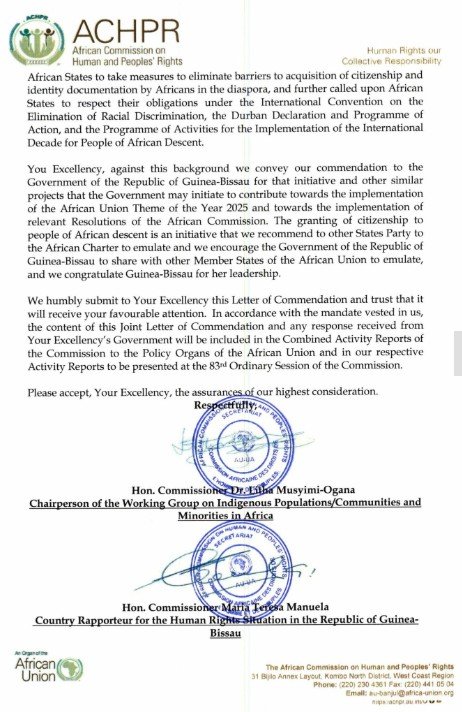
Siphiwe Baleka, President of the Balanta B’urassa History and Genealogy Society in America (BBHAGSIA) and Coordinator for Guinea Bissau’s Decade of Return program stated,
“More and more people are looking to their ancestral homeland both as a place of refuge and as a place of opportunity. It is among my greatest achievements to have helped so many Afrodescendants exercise their Right to Return and repair the damage of ethnocide and loss of their identity and status in the world. Citizenshp in one’s ancestral homeland is the first reparation that African Union member statess must provide before any reparations from the enslaving nations.”
President Ibrahim Traore and the Republic of Burkina Faso is now joining Ghana, Sierra Leone, Guinea Bissau and Benin in granting Citizenship to Afrodescendants. Yesterday at 10:23 pm, following the Friends of President Ibrahim Traore in the West delegation’s debriefing following their succesful mission to Burkina Faso, the African Diaspora Development Institute (ADDI) announced,
The government of Burkina Faso has confirmed that our ADDI mission trip to include the conferement of Burkina Faso citizenship will take place from October 26th to November 8th, 2025. Come to our zoom meeting Saturday, July 19th at 11:00 am EST to find out more.”
According to the ADDI Website, on January 18, 2025 ADDI announced that President Traore put an executive order in place in which “The government of Burkina Faso has asked ADDI to spearhead a citizenship initiative that invites African Diaspora to apply to be citizens of Burkina Faso.
There will be two Tiers of applications.
Tier I=All those who have traced their lineage to Burkina Faso through their DNA.
Tier II=Any black Diaspora
The government of Burkina Faso has indicated that the ceremony conferring citizenship will happen in June 2025.” That ceremony has now been confirmed to take place from October 26th to November 8th.
Meanwhile, back in September, 2024, Benin’s President, Patrice Talon, passed a law in September 2024 that gives citizenship to those who can trace their lineage to the slave trade, part of an attempt by the country to reckon with their participation in the slave trade. The way the law works is that anyone over the age of 18 who does not already hold African citizenship and can provide proof that an ancestor was deported via the slave trade anywhere in Sub-Saharan Africa is eligible to become a citizen of Benin. Benin’s authorities will accept a variety of materials, including DNA tests, authenticated testimonies, and family records. Applications will be vetted, applicants will receive a provisional certificate of nationality, which is valid for three years, and in order to complete the process, they must stay in Benin at least once within the three years to become a citizen.
Applications for recognition of Beninese nationality for Afro-descendants must be submitted via the https://afrodescendant.gouv.bj platform. According to the website,
“The provisional certificate of recognition of nationality is issued within one (01) month. Applications for definitive attestation of Beninese nationality by recognition are submitted to the Minister of Justice by the applicant who is physically present on the territory of the Republic of Benin.
The provisional certificate gives the beneficiary freedom of entry, residence and exit from the territory of the Republic of Benin.
Beninese nationality by way of recognition is granted by a decree issued by the Council of Ministers on a proposal from the Minister of Justice. Beninese nationality by recognition confers on the beneficiary :
- freedom to enter, reside in and leave the territory of the Republic of Benin.
- the right to a certificate of Beninese nationality by recognition and a Beninese passport.
- the right to pass on Beninese nationality to descendants.
Beneficiaries of Beninese nationality by recognition may acquire full Beninese nationality and all the rights attached thereto at any time, in accordance with the legislation on nationality.
Next Steps Following Historic Mission of the Friends of President Ibrahim Traoré in the West Delegation
July 10 - The Friends of President Ibrahim Traoré in the West (FPITW) delegation has returned from its historic mission to Burkina Faso.
A virtual debrief on Monday, July 14 at 8:00 PM EST has been scheduled where the Delegation will share highlights and extraordinary insights from their recent historic journey to Burkina Faso. This briefing will provide an inside look at our experiences on the ground, key findings, and the meaningful connections forged with leaders and communities.
Join the July 14 Virtual Debrief Zoom Meeting a 8:00 PM EST:
https://us06web.zoom.us/j/87284524405?pwd=z170AEDg4kUCOnY5ZAfmaK1Qn9CgfP.1&jst=2
Afrodescendant Special Envoy to Burkina Faso, Mr. Siphiwe Baleka and Afrodescendant Nation Lead Counsel Harriet AbuBakr with Burkina Faso Minister of Foreign Affairs Mr. Karamoko Traoré in Ouagadougou, Burkina Faso.
Already many are already asking, “what’s next?” During our meeting with the Burkina Faso Minister of Foreign Affairs Mr. Karamoko Traoré, it was agreed that a “broad framework” for engagement was the next order of business. Here are some important developments:
FPITW has opened an office inside the École Américaine de Ouagadougou to serve as the headquarters for activities in support of Burkina Faso, its people and its President and thereby to assist in supporting the Alliance of Sahel States.
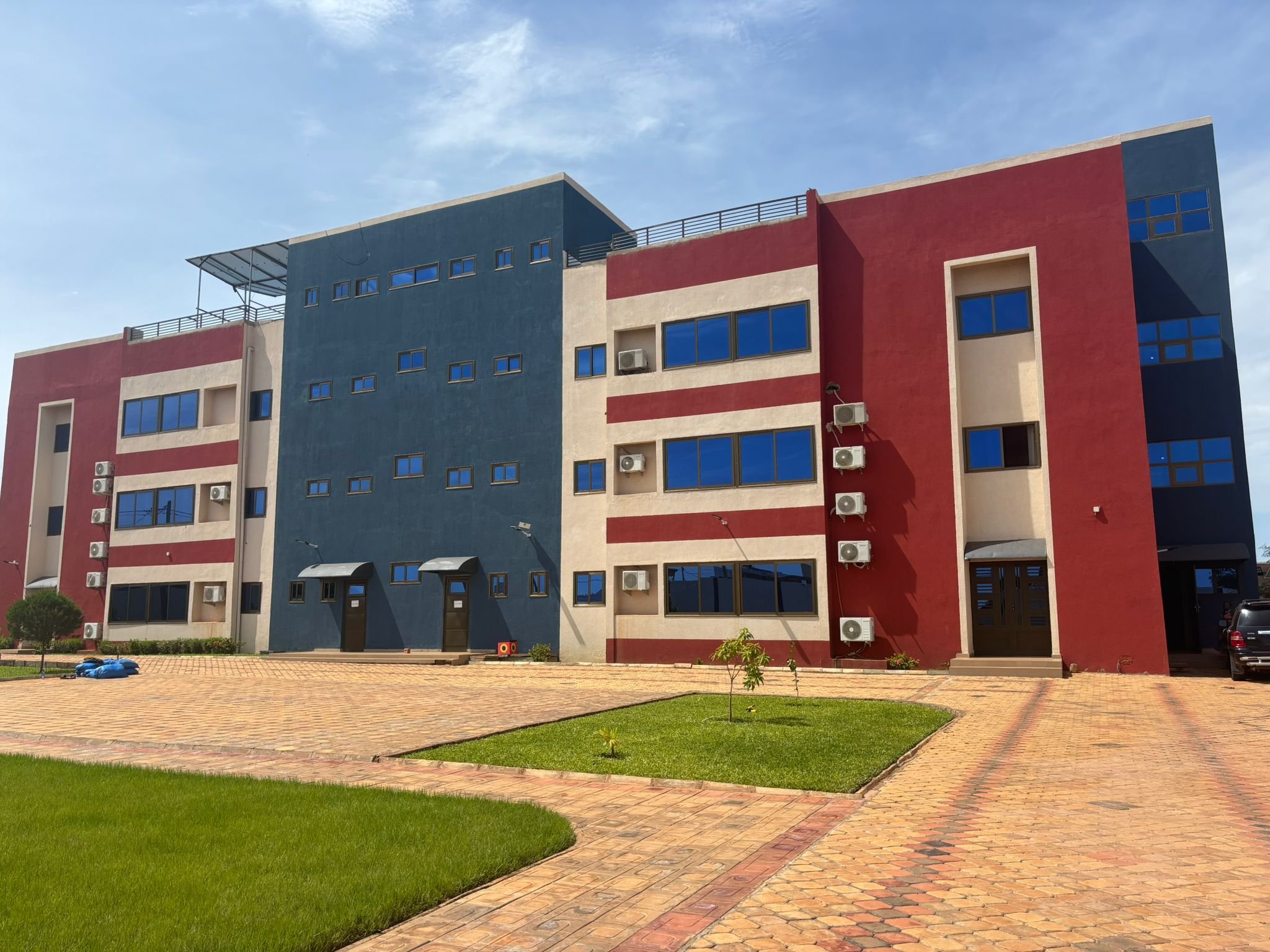
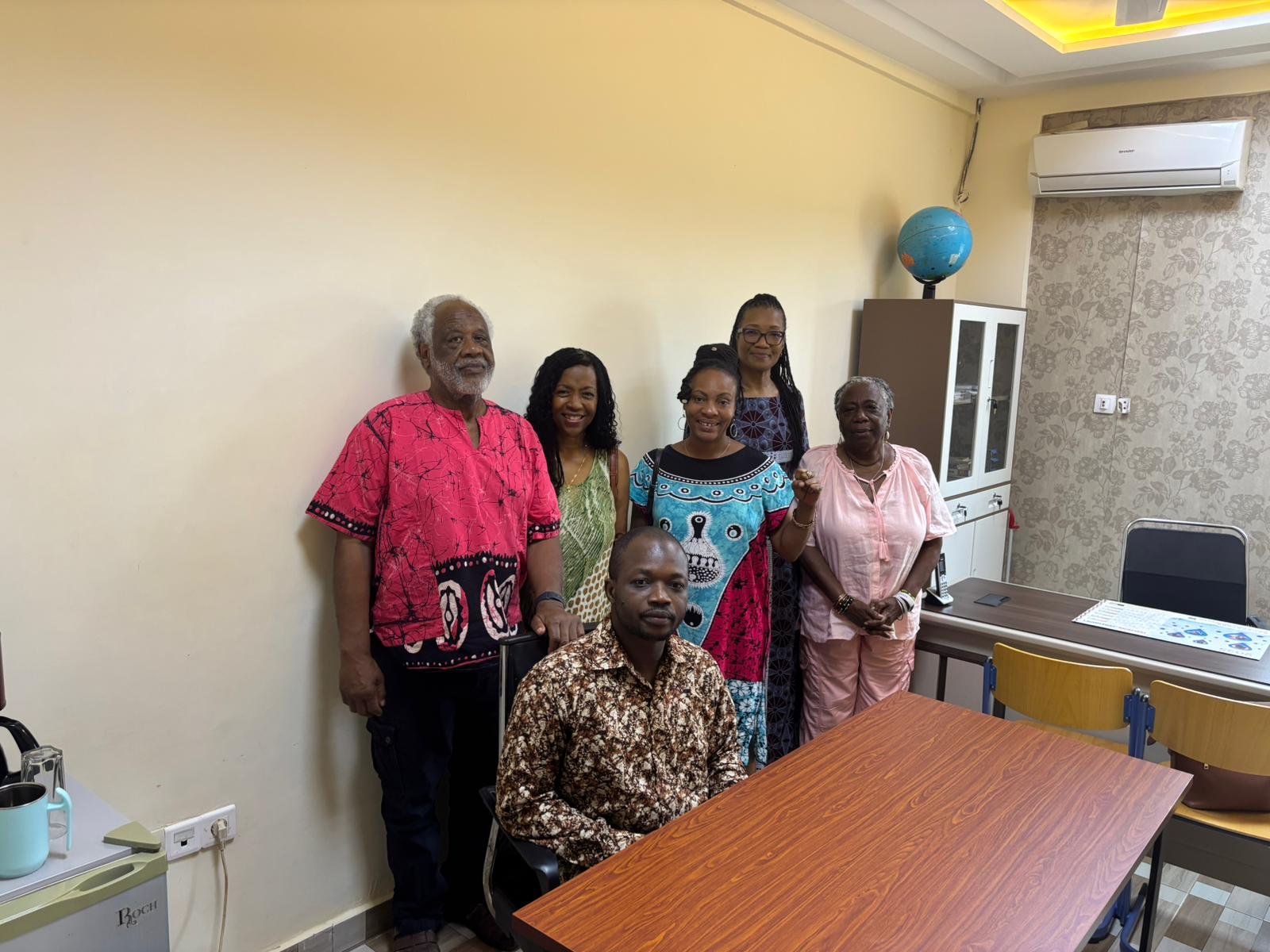
2. The École Américaine de Ouagadougou (The African American Academy) is offering an exciting global opportunity available to passionate young people in our community: the Teach For Africa Fellowship Program.
Through this paid fellowship that includes competitive local stipend plus housing assistance and flight reimbursement for a two year commitment, recent graduates and aspiring leaders have the chance to teach at an African-centered schoo in Ouagadougou, Burkina Faso, gain international work experience, and contribute to empowering youth through education. Fellows receive professional training, mentorship, and support while immersing themselves in African culture and making a lasting impact.
The African American Academy is currently recruiting talented individuals from our local community who:
Hold a Bachelor’s degree (any field)
Are passionate about leadership, youth development, and Africa
Are eager to grow personally and professionally through global experience
No teaching experience is required—comprehensive training is provided.
This program can help transform the lives of many promising young people in our community.
For more details or to apply, please visit www.aaa-bf.org or email admin@aaa-bf.org with any questions.
3. The next delegation, consisting of sixteen people, will take place August 3-10 for a Diaspora Business and Investment Forum and will again meet with the Minister of Foreign Affairs, H.E. Karamoko Traoré. Out of this tangible investment and development initiated by Afrodescendants must be realized because this is what Burkina Faso needs now.
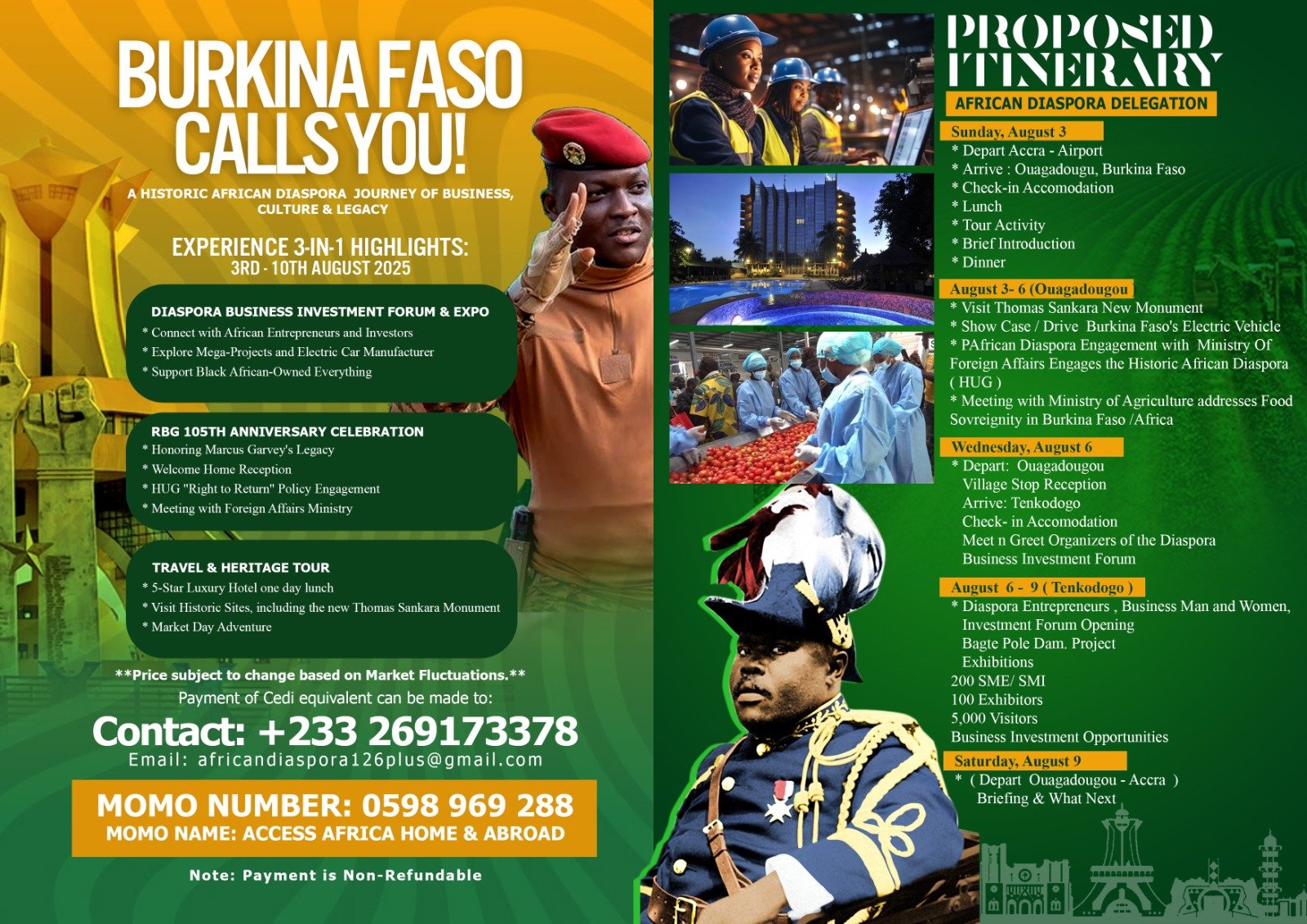
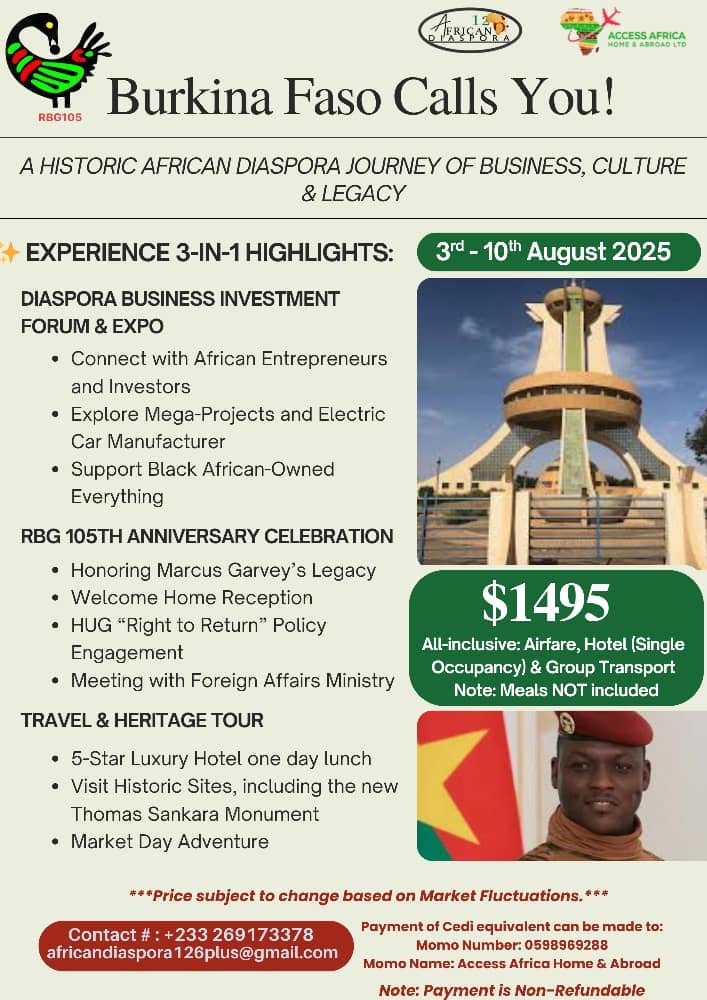

4. FIPAN (Nguekhokh International Pan -African Festival) 2025 in Burkina Faso (Ouagadougou) will be held from October 1 to October20,
* What is Fipan?
The Fipan or International Pan -African Festival of Nguekhokh, is a great gathering of economic, political, social and cultural actors on the continent, and, of its diasporas in order to discuss and propose solutions on issues and news challenges.
It is a framework for reflections, proposals and actions for which, basic organizations, must harmonize their approaches for more impact at the community level.
Our ideal is the construction of an African federal state, however this process requires coordinated actions conducted by Pan -African civil society, before leaning on the institutional and political scheme existing adapted to African realities.
* When and where did the FIPAN were born?
The FIPAN is set up in 2015 in the commune of Nguékhokh in the city of Mbour in Senegal, to offer a framework for reunion and exchanges to Pan -Africanism.
* Fipan vision
FIPAN is intended to be a geopolitical and diplomatic instrument of peoples, built around culture, art, by allowing an interconnection between actors, between institutions and between policies to lead to a concrete fusion in a dynamic process of endogenous development.
It is a school, to participate in mental deconstruction and ideological training by pooling achievements and experiences.
* Who participates in the fipan?
More than 20 African delegations and diasporas.
Cultural actors, craftsmen, artists, politicians, students, students, sociologists, guarantors of African ancestral values ... (all social components).
* Where and when will the 10th edition be held?
The 10th will be held in Ouagadougou capital of Burkina Faso, from October 01 to 20, 2025.
* What will this 10th edition wear?
For this 10th edition of the FIPAN, the main theme will focus on:
The challenges of economic sovereignty, practical case: alliance of the states of the Sahel (AES)
* What activities are planned?
- Conferences- Debates - Panels
-Ciné-forum
-Theatres-concert-taders
-Avisit of historical sites
-Righty
-Foire -Exposition
-Arebres to palaver etc ...
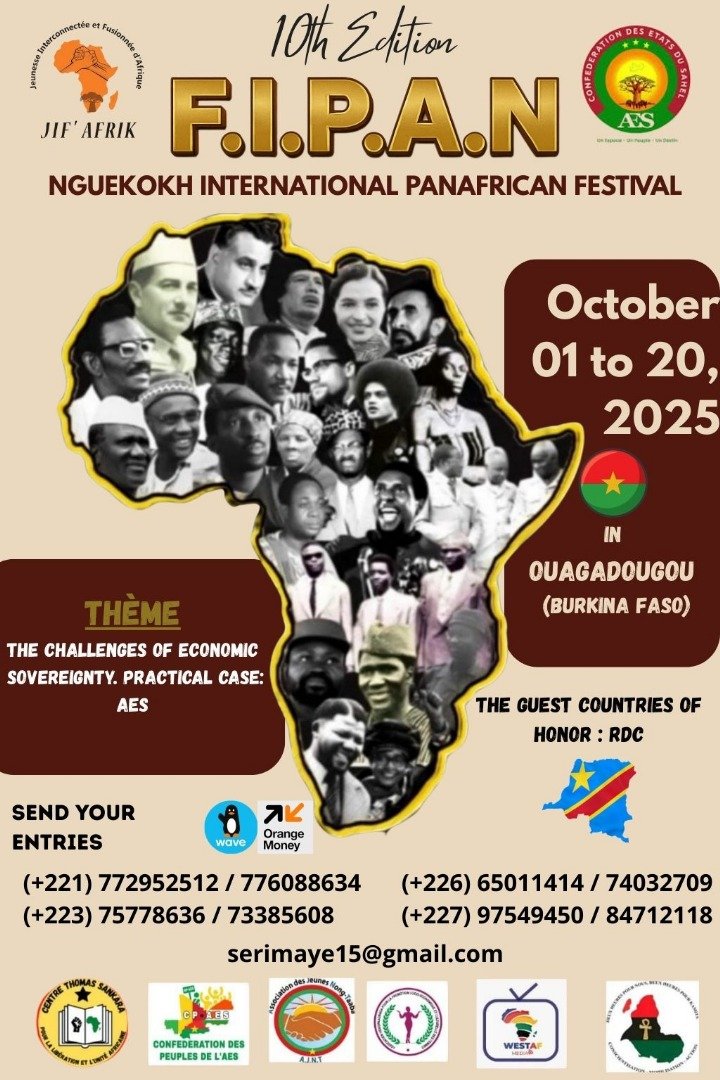
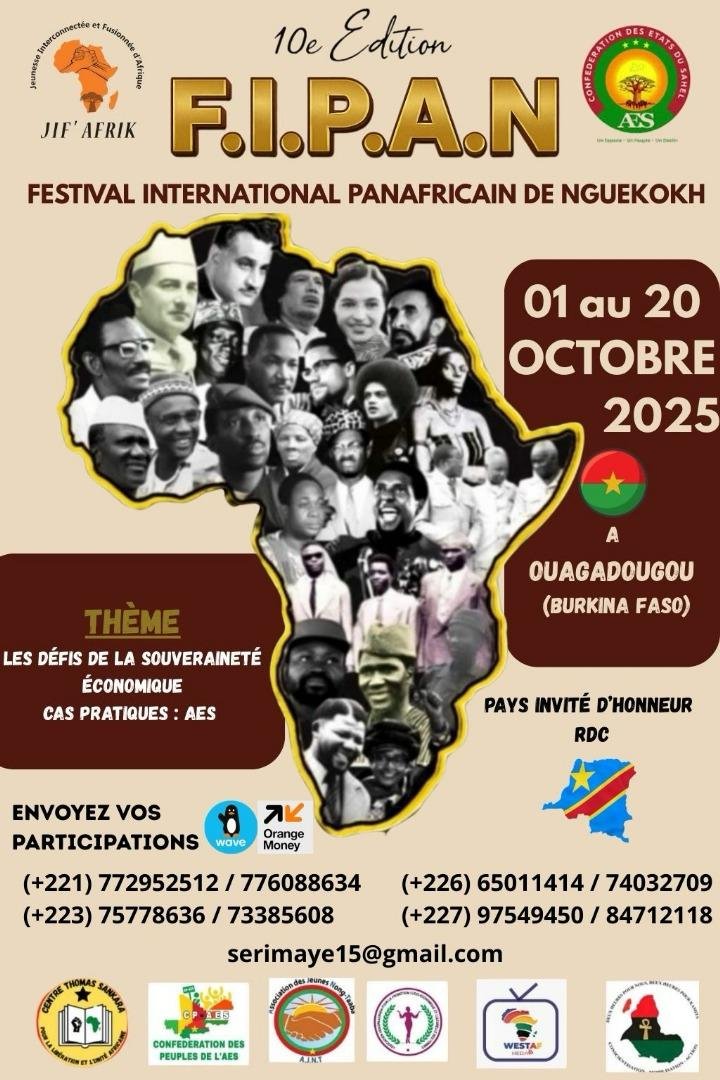


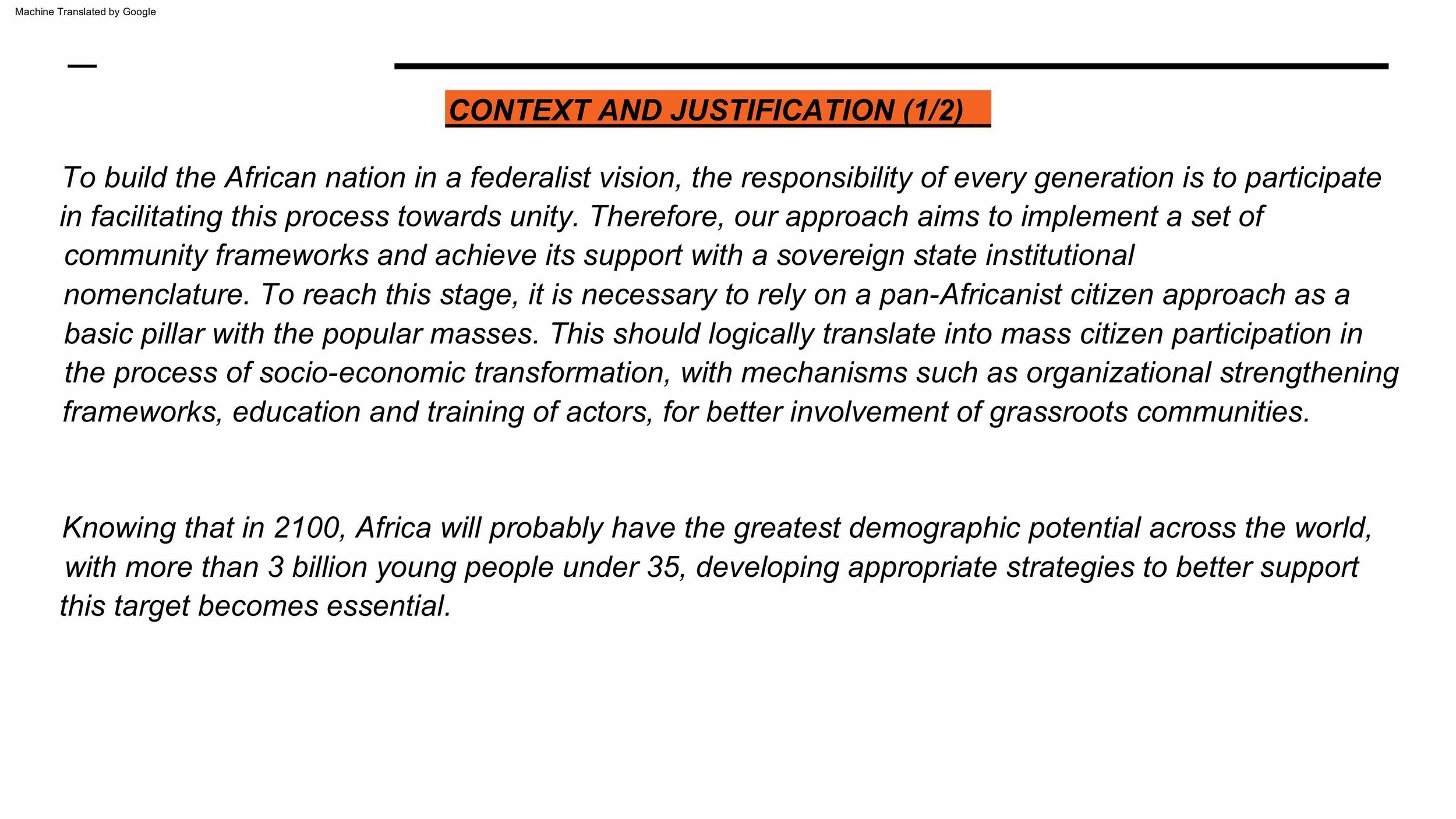



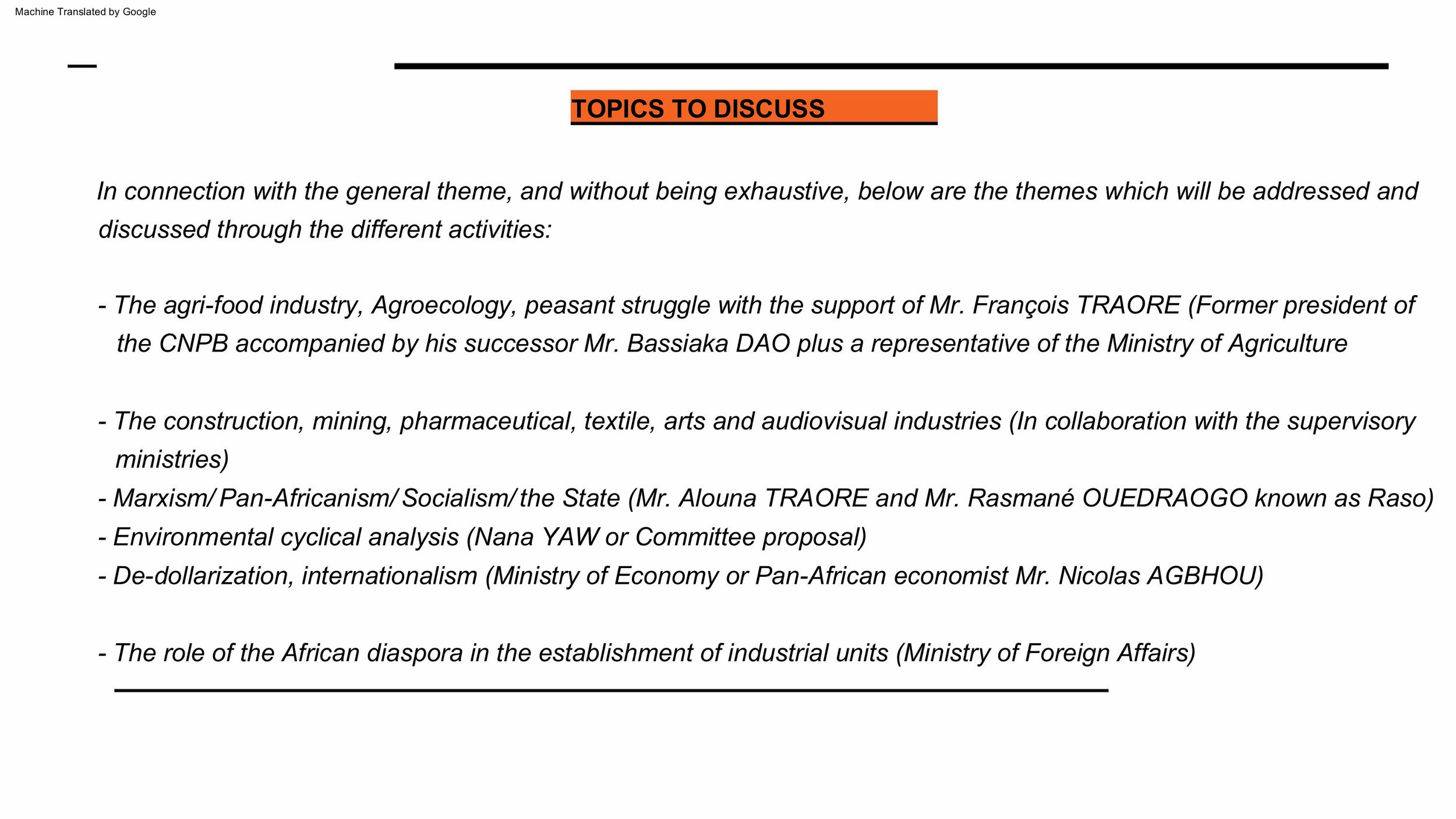
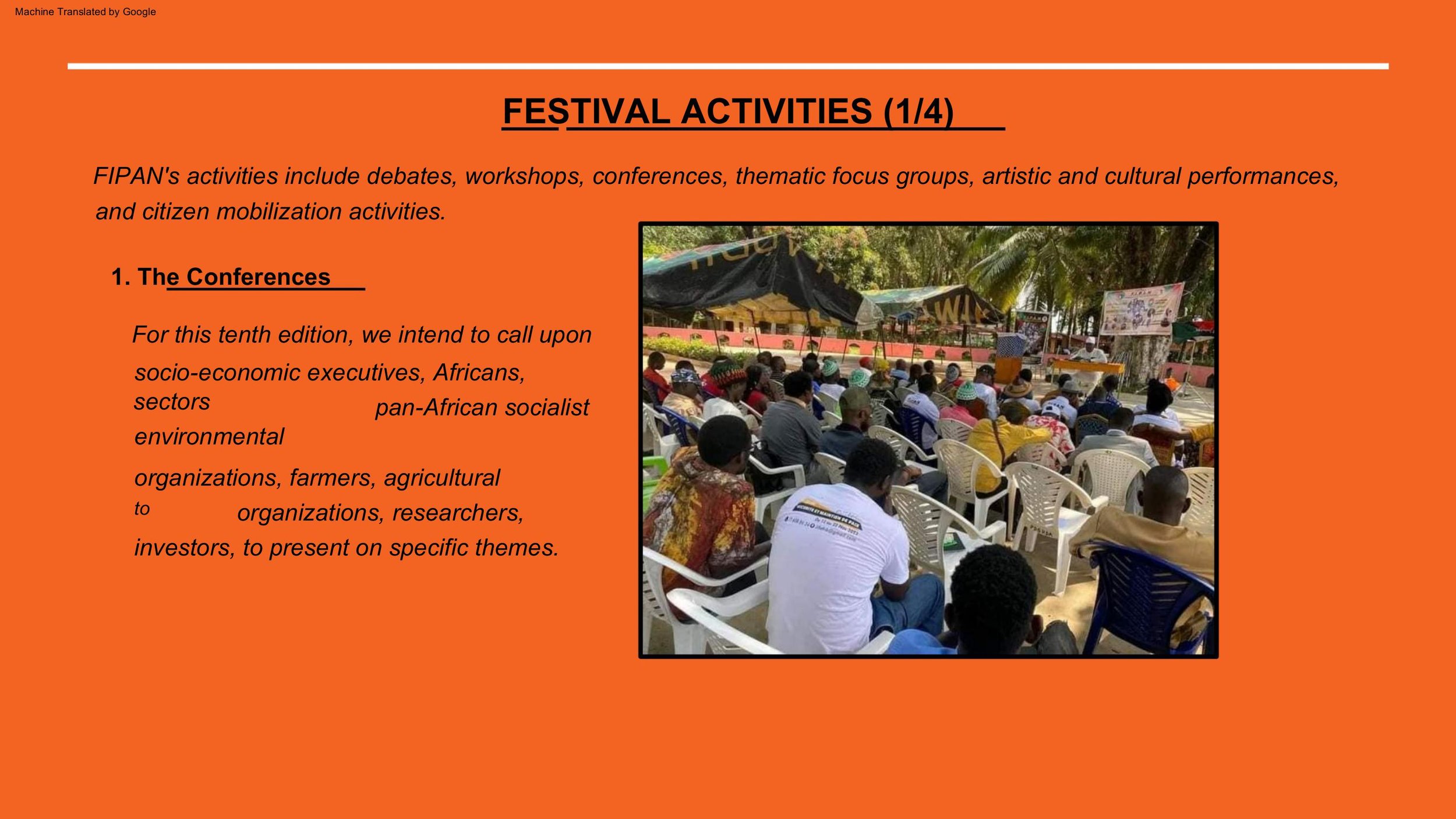

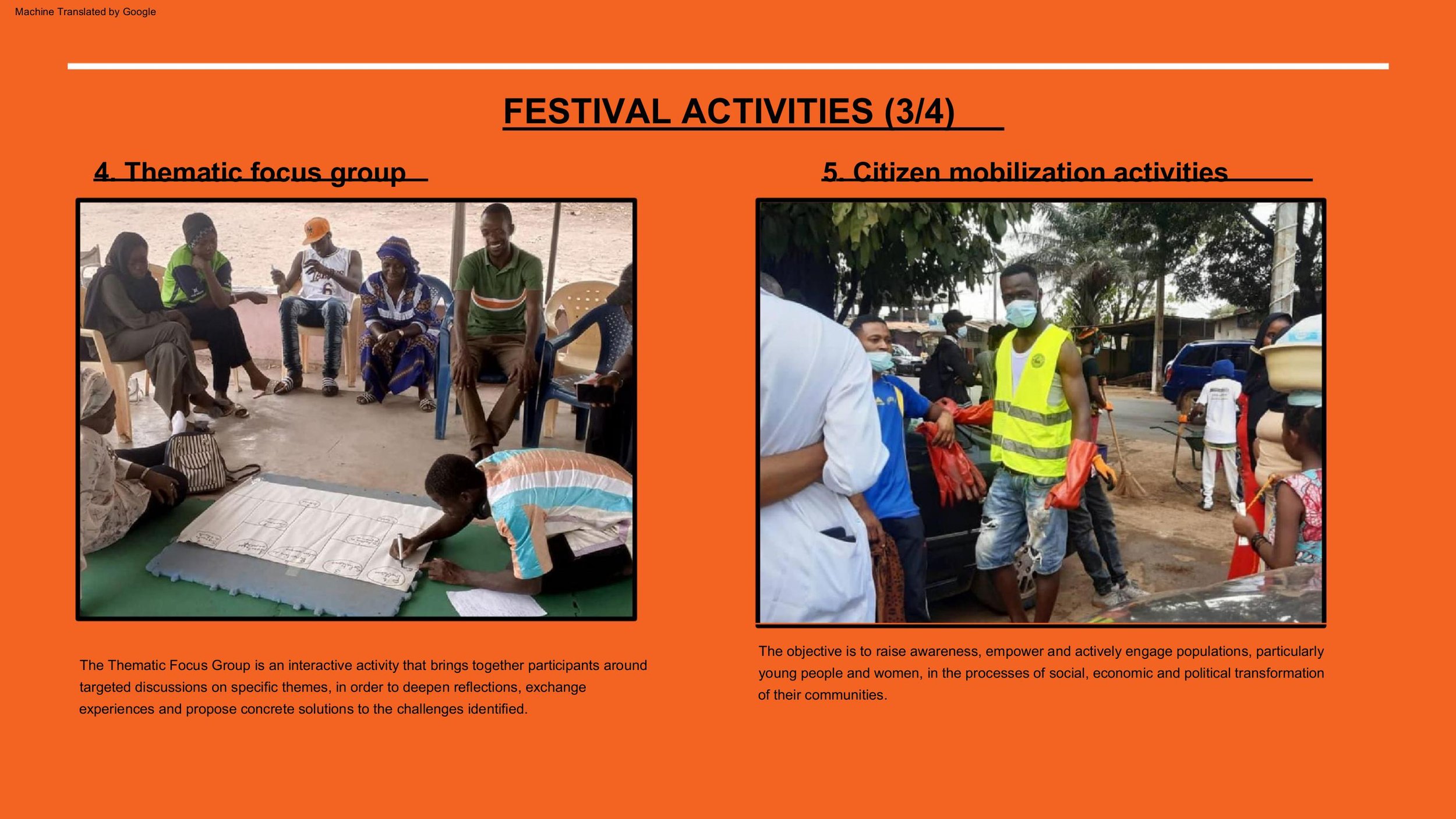
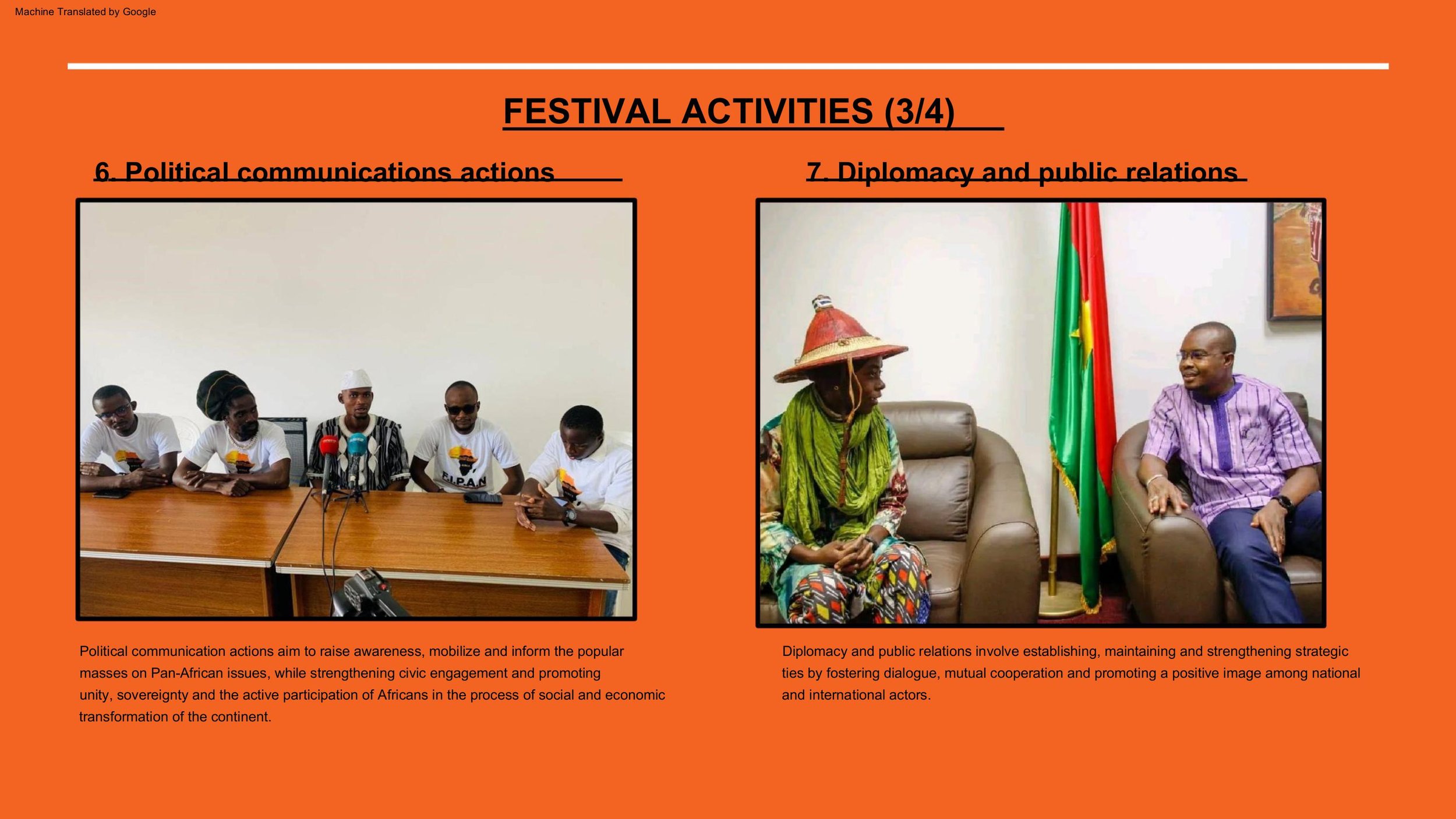



5. Burkina Faso may be holding the next Pan African Congress in May of 2026. On April 5, 2025, following the proposal submitted by Siphiwe Baleka, the Governing Council of the Global Pan African Movement (GPAM) officially proposed that the Alliance of Sahel states sponsor the Congress to be hosted in Ouagadougou, Burkina Faso. The letter to President Traoré stated,
“In addition to majority support within the Governing Council, we/I received an overwhelming mandate from the Latin American/Caribbean Regional Preparatory Conference for 8th PAC which convened on the 30th of March, 2025, to approach Your Excellency and request through your Office, that the Confederation of Sahel States co-host the 8th Pan African Congress over a period of five days toward the end of November in Ougadougou.”
It has been reported to this author that Traoré administration has initially agreed although there is now some debate about the original date which might not be enough time for proper organizing and which would directly conflict with the 9th Pan African Congress that is planed to be held in Lome, Togo from December 8 to the 12. Thus, the new date of May 2026 is being discussed for Burkina Faso and we pray that this comes to fruition.
Join the July 14 Virtual Debrief Zoom Meeting a 8:00 PM EST:
https://us06web.zoom.us/j/87284524405?pwd=z170AEDg4kUCOnY5ZAfmaK1Qn9CgfP.1&jst=2
BLACK INDEPENDENCE DAY LIVE INTERNATIONAL BROADCAST JULY 4
DON’T MISS THE PAN AFRICAN EVENT OF THE SUMMER!
CLICK HERE TO JOIN THE LIVE BROADCAST ON JULY 4 STARTING AT 10:00 AM EST
Live from the Ambassadors’ Hall of the Government of the Republic of Burkina Faso


Honoring the Father of the United Nations Permanent Forum on People of African Descent (PFPAD): Silis Muhammad and His Interventions On Behalf of Afrodescendant Self Determination
“Self Determination is our right, Separation with all our might, Reparations is our fight.”
“The prayers of African Americans for justice and reparations have been rejected by the U.S. Government and, seemingly, the United Nations. Because the struggle seems hopeless, the African American population has reached a state of extreme anxiety. We observe that some leaders are considering changing their tactics because of the failure of peaceful and legal means of solving the problem. We believe that African Americans may decide to use extreme measures and thereby gain the attention of the world community. We fear that the U.S. Government may respond with imprisonment of African American leaders.”
— The Honorable Silis Muhammad, written statement to the United Nations, 1997
“The Universal Declaration of Human Rights states that recognition of the inalienable rights of all members of the human family is the foundation of freedom, justice and peace in the world. Here, at the beginning of the histories of the so-called African-Americans, the enslaved Africans brought to America were defined in the same terms as the ‘cattle’ belonging to Anglo-American rulers. Thus, our rights were those of their ‘cattle’: ours were not human rights. Yet we were then-and are, still, members of the human family. Our inalienable rights were distorted so completely, that we are damages goods, still. We are lost from our original inherent culture, religion and language. America cannot lawfully force us to accept the choices which she deems to be our inalienable rights; nor can she force us and our progeny to abandon the hope for the reclamation of our own. One hundred thirty four years of forced assimilation has not abrogated the desire to know, and to be ourselves. Today, we have no permanent national recognition, as a result of slavery. We have been identified as slaves, Niggers, Negroes, Coloreds, Black-Americans and today we are so-called African-Americans. Thus, we are to this day a revolving nation, suspended withing a nation: rent from our roots, as a result of slavery and its lingering effects. We are detached, still, from our inalienable rights. To this extent, the very foundation upon which freedom, justice and peace among nations is established is for us non-existing; our inalienable rights are extinct! Recognition of inalienable rights, for us, is a faith hoped for. And this poses a threat to peace for the United States of America, for the Americas and potentially for Europe. Why? It is a threat because of the despair of the many; which will endlessly be ignited to loathing and, or rioting. It will be ignited, lawlessly, by the perpetual humanitarian desires of the few: if the fever, or this abnormal situation, is not reversed by the few humanitarians who aim lawfully and by sanctions to efficaciously stamp out violations of the Universal Declaration of Human Rights. . . . African-Americans have looked toward and exhausted all remedies made available by the majority government, although, it is viewed as the oppressor. . . . We wish to address the question of whether we choose to reclaim or recapture our original culture, language, religion and identity, or whether we choose to assimilate into the majority culture of America. Upon this matter we have never enjoyed the freedom of choice. We pray to the Commission on Human Rights for the right to make our choice within the protection of a United Nations Forum.”
- The Honorable Silis Muhammad written statement to the 55th session of the UN Commission on Human Rights
**********************************************************************************************************
Mr. Muhammad’s abbreviated list of United Nations (UN) interventions delivered in advancement of Afrodescendant human rights and reparations for plantation slavery is listed below:
1994 Petition for Reparations to the UN under 1503 Procedure - Mr. Muhammad delivered a 1503 communication to the UN WOrking Group on Communications on behalf of African Americans. Although it was received, it was not heard nor was it responded to by the UN.
1997 Written Statement to the UN - Mr. Muhammad recommended a forum so that African-American human rights grievances, that formed the basis of a petition submitted, can be expressed systematically, as well as officially recorded, evaluated and remedied. [Siphwe Note: Here then is the vision that first called for the Permanent Forum on People of African Descent (PFPAD)].
1998 Written and Oral Statments - Mr. Muhammad urged the Commission on Human Rights to assist African Americans in their efforts to recover from official U.S. policies of enslavement, apartheid, and forced assimilation. Mr. Muhammad prayed that the human rights of African Americans be recaptured politically and amicably, rights to self-determination rectified, and the damages sustained be awarded in great measure in order to accomplish the cathartic cleansing mentally, emotionally, and physically of 400 years of long-suffering. Mr. Muhammad prayed that the U.S. Government not be given tacit approval of the UN to subvert the opening of a forum wherein African-AMerican grievances can be expressed systematically and officially recorded, evaluated and remedied.



1999 Written and Oral Statements - Mr. Muhammad requested recognition of the African American choice of human rights and inalienable rights. He requested the crime of plantation slavery, and its lingering effects, be rectified - which was, and is still, a crime against African Americans and against humanity. Mr. Muhammad asked the U.N. to establish a forum for the purpose of restoring African American human rights, their political being, and their status as a people. Mr. Muhammad urged recommendation that the Sub-Commission pass a resolution recognizing slavery and the slave trade as a crime against humanity. He urged the writing of a working paper as a way to begin analyzing African American’s situation. Mr. Muhammad urged African American inclusion in the Declaration on the Rights of Persons Belonging to National or Ethnic, Religious and Linguistic Minorities, or a new declaration be written for African Americans. Mr. Muhammad asked the International Labor Organization to look into America’s privately owned prisons.
2000 Written and Oral Statements - Mr. Muhammad asked that the U.S. pay reparations to the so-called African Americans, since the U.S. cannot restore the “mother tongue” of African Americans if ever it wanted to. Mr. Muhammad recommended the U.S. be held liable, at the least, for the last 51 years, plus the additional years which are needed to resolve this issue. He asked that the UN place a reparation sanction upon America if the identity and language of minorities and Peoples are to be preserved. Mr. Muhammad asked that a precise dollar amount be given at a future date, if warranted, and that he stated that he would ask for the release of a number of African-American human rights victims who have been unjustly incarcerated in federal and state penitentiaries. Finally, Mr. Muhammad asked the UN to impose a sanction on the U.S. in the form of exemption from all taxation upon our people for as longa s this issue is in the hands of the UN.
World Conference Against Racism Written and Oral Statements - Mr. Muhammad recommended that the World Conference Against Racism declare a decade to consider the issues of slave descendants, including whether “LOST FOND Peoples” is the term that best identifies slave descendants.
Regional Seminars for Afrodescendants Oral Statements - Mr. Muhammad put forth the name Lost Found Peoples as a name in order to gain human rights protection for slave descendants, but the name Afrodescendants was agreed upon by unanimous consent.
2001 Written and Oral Statements - Mr. Muhammad urged UN intervention to protect and assist African-American leaders within a forum as they seek to determine the damage they have sustained and the means of reparation needed in order to bring them back to life as a People. Mr. Muhammad prayed for the Commission on Human Rights to hear the African American demand for the right to choose to reconstitute, and reconstruct lost ties, since no international instruments, arbitrations, mechanisms or laws requiring the recognition of minorities that can restrain ethnic conflict during 2001. Attorney Harriet AbuBakr, Mr. Muhammad’s wife, asked the Working Group on Minorities to cause minority protection to develop in accord with the African American needs for resurrection.
2002 Written and Oral Statements - On behalf of African Americans, Mr. Muhammad asked the Sub-Commission on the Promotion and Protection of Human Rights to acknowledge the decision that African Americans be recognized as Afrodescendant Minorities. Mr. Muhammad also recommended that the Commission on Human Rights pass a resolution requesting that the Sub-Commission on the Promotion and Protection of Human Rights place African Americans on its agenda, alongside Indigenous Peoples and Minorities. Mr. Muhammad also put forth a prayer for official recognition of a self-chosen collective identity and reparations for African Americans.
2003 Written and Oral Statments - Mr. Muhammd requested official recognition of new minorities, urged the establishment of an International Year for Minorities, requested support for the efforts of the Working Group on Minorities, and recommended that the Working Group on Minorities organize a second Regional Seminar for Afrodescendant Minorities. Attorney AbuBakr asked the Working Group on Minorities to validate Afrodescendants self-chosen identity in its documents, and use any other means available to place the fact of the existence of Afrodescendants before the UN and the world.
2004 Written and Oral Statements - Mr. Muhammad called upon the UN to grant Afrodescendants protected collective human rights. Mr. Muhammad also asked the Sub-Commission to make a commitment to minorities that their interventions will be heard. Mr. Muhammad requested the recognition, protection and assistance of the Commission on Human Rights, and the authorities of the UN.
2005 Written and Oral Statements - Mr. Muhammad recommended santions against all governments that have deprived Afrodescendants, for every day Afrodescendants have been so denied human rights. He also requested assistance to Afrodescendants in efforts to have a self-chosen identity recognized and protected by the entire UN and by the governments under which Afrodescendants live.
2006 Written and Oral Statements - Mr. Muhammad requested formal UN recognition of slave descendant’s self-chosen name, Afrodescendants, and requested restoration of slave descendants to the human families of the earth.
2008 Oral Statment - Mr. Muhammad requested that the UN Working Group on Minorities assist Afrodescendants to establish education for Afrodescendants in their original (mother) tongue.
2014 Open Letter to U.S. President Barack Obama - Mr. Muhammad sent a letter to U.S. President Obama, Congress, General Dempsey, and the Pope of Rome requesting reparations for Afrodescendants.
MY CONNECTION TO SILiS MUHAMMAD
Though I have yet to meet him, I feel a strong connection to the Honorable Silis Muhammad. And that’s because in 1997, I was tasked with studying and submitting a petition to the UN under its 1503 procedure by a former student of Malcolm X, Dr. Y.N. Kly. Although petitioning the United Nations was nothing new - W.E.B. DuBois and Marcus Garvey had petitioned the League of Nations, and William Patterson, Paul Robeson and Queen Mother Audley Moore had already petitioned the United Nations, the 1503 procedure was new. In my studies, I came across Silis Muhammad’s 1994 1503 Petition. As far as I know, my 1997 Petition of the Nkrumah-Washington Community Learning Center On Behalf of their Members, Associates and Afro-American Population Whose International Protected Human Rights Have Been Grossly and Systematically Violated By the Anglo-American Government of the United States of America and Its Varied Institutions was the second such petition submitted under the United Nations 1503 Procedure. And hence my collegial connection to the Honorable Silis Muhammad.
But the connection goes a bit deeper. The Honorable Silis Muhammad is a man, a leader, ahead of his time, fighting for our liberation in the international arena with very little acknowledgement or support. Even today his work is under-appreciated in the various movements and I was guilty of overlooking Mr. Muhammad’s contributions to the reparations movement when I compiled this history of the modern reparations movement.
When a national/international forum entitled “Revitalizing the Reparations Movement” was convened at Chicago State University on Saturday, April 19, 2014, incredibly the Honorable Silis Muhammad was not there!
The exclusion of Mr. Muhammad’s work and legacy is unfair. I feel this same way about my own work, begun in earnest in 2003.
Like Mr. Muhammad, in the mid to late 1990’s, my focus was on the United Nations as an arena for the reparations struggle. However, Let us recall that in 1996 the Economic and Social Council of the United Nations granted consultative status to the Rastafari Movement who were represented by Ras Bongo Spear and Ras Boanerges. In 1998, at the United Nations in Geneva, Switzerland, Ras Bongo Spear and Ras Boanerges asked: “What is the responsibility of the nations to Africans in the diaspora with respect to the age-old quest for Repatriation?” Said the Rasses, “Our advice from that committee and from the UN Office of Human Rights . . .. was simple:
“The United Nations as an organization of states cannot at this time in any serious way entertain the issue of repatriation without the consent of the African states and the African Governments to which we want to go in Africa. So we were directed to seek the support of African governments with respect to the acquisition of land. And after that, the matter can be brought up again to the United Nations and the issue of [settlement] can take place.”
As a young, devout Rastafari youth, I then switched my focus to repatriation and the Organization of African Unity (OAU). In 2003, I went to Ethiopia, and as a credentialed journalist for the Rastafari Speaks newspaper, attended the 1st Extra-Ordinary Summit of the Assembly of the African Union in Addis Ababa. It so happened that, like Malcolm X at the Organization of African Unity (OAU) in 1964, I was the only Afrodescendant at the African Union when the decision was made to invite and encourage the African Diaspora in the African Union through the Article 3q amendment that was adopted while I was there. As the de facto representative of the Afrodescendants at this pivoral moment in history, I felt a deep sence of responsibility and obligation. Ultimately, I becme the Director of the African Union 6th Region Education Campaign, working in this new arena of the African Union. At the time as well as now, much of my work went unreported and thus, un-recognized. It was my job to make the importance of the new AU 6th Region known and elevate the struggle to have Afrodescedants’ Right to Return to their ancestral homelands recognized.
So at the time that Silis Muhammad was championing the cause of Afrodescendants at the United Nations, I was championing the cause at the African Union.
It is no coincednce that at this next pivotal moment in our history, when Burkina Faso President Ibrahim Traore and the Alliance of Sahel States is leading the fight against neocolonialism and imperialism in Africa, that the Afrodescendant Nation led by the Honorable Silis Muhammad and myself are playing key leadership roles in the Friends of President Ibrahim Traoré In the West Delegation. Some things are just a matter of destiny.





Oral Statement to the Forum on Minority Issues, First Session,
Agenda Item VI: The Relationship Between Desegregation Strategies,
Cultural Autonomy and Integration in the Quest for Social Cohesion, December 2008
Greetings Madam Chair, Madam Gay McDougall, Experts, Country Representatives, Scholars and Minorities:
One of the purposes of this Forum is the identification of challenges and problems facing minorities and States. We, Afrodescendants, want for ourselves and for our children an education, especially now at our inception as an internationally recognized human family. We want an education in our original (mother) tongue. UN scholars state that language, not just any language, but one's "mother tongue" is intimately bound with identity. Thus, the right to such an education is an identity right.
Article 1, Section 1.1 of the Declaration on the Rights of Persons Belonging to Minorities indicates States shall protect and promote the identity of minorities. The United States of America, mainly, as well as other States, have breached this United Nations obligation. Since the abolition of slavery until now, Afrodescendants have been denied self-identity: education in our mother tongue. It is the very dignity we are without. The former slave-holding States have a duty to protect not only the existence but the national, ethnic, cultural, religious and linguistic identity of Minorities.
Mr. M. Cherif Bassiouni stated, in his final report to the 56th session of the Commission on Human Rights, that economic compensation for victims of gross violations of human rights should be provided for any assessable damage resulting from violations of international human rights and humanitarian law: (b) lost opportunities, including education. Since we were forcibly deprived of our mother tongue due to slavery and its lingering effects, we want compensation from those States, especially the United States, responsible for denying us an education intimately bound with identity. Afrodescendants claim the right to compensation for violations of international law, articulated in the Declaration on the Rights of Minorities as well as Article 27 of the ICCPR, due to lost opportunities, including education.
In conclusion, we suggest that the regional forums for Afrodescendants, started under the auspices of the former Working Group on Minorities, be continued so that Afrodescendants can discuss practical, acceptable and adaptable solutions to the unique problems we face.
Thank you.
Mr. Silis Muhammad
OPEN LETTER TO PRESIDENT BARACK OBAMA 2014
President Barack Obama/President of the United States,
U.S. Congress, General Martin E. Dempsey, Joint Chief of Staff and The Pope of Rome
Silis Muhammad
CHIEF EXECUTIVE OFFICER
THE LOST-FOUND NATION OF ISLAM
TO: President Barack Obama, President of the United States
U.S. Congress
General Martin E. Dempsey, Joint Chief of Staff
Pope of Rome
FROM: Silis Muhammad
RE: THE BLUEPRINT: OUR PLAN FOR AMERICA AND ITS AFRODESCENDANTS
DATE: January 15, 2014
The peoples and Governments of the world are well aware of the duplicity of the United States Government as it calls for Human Rights and democracy while continuing, to this day, systematic discrimination against and disenfranchisement of its Afrodescendant population--the inheritors of the legacy of plantation slavery (the so-called African Americans). While we recognize that moral leadership is the tone that the United States Government wishes to convey to the world, it as failed to take the key moral action that would begin to repair the ongoing wrong that has existed since the very inception of this government. Does anyone recognize the significance of this key to peace?
I am Silis Muhammad, Chief Executive Officer of the Lost-found Nation of Islam. If we could summon the hatred our ancestors had for this Caucasian American Government and bring that condition to bear on the shoulders of this generation of Afrodescendants the resulting wrath would be like unto a blaze of fire, the size of which would engulf the United States. It would burn for 1,000 years! The evil done to the Black man by the American government far surpasses the evil done by any other Government, especially the Governments of France, Germany, Great Britain, and Canada.
We are determined to leave America, not less than 144,000 of us, Arfodescendants. We, the children of plantation slavery, were subsumed by the thirteenth and fourteenth amendments of the Constitution of the United States of America, which does not, in the least, express our will. We want no part of the prophesied imminent doom of America.
We want the United States, in cooperation with the International Monetary Fund, to arrange for forgiveness of all debts owed by St. Kitts and all other members of CARICOM, who would welcome, with full citizenship, appropriate numbers of educated and industrious Afrodescendants from the United States. We are asking for sea-going and air-going ships or vessels and freeway, highway, bridge, and road building materials and equipment. We are asking for equipment to cultivate land. We need materials and machinery with which to make clothing, shoes, and furniture and we need materials and equipment to for putting in infrastructure. We want housing, apartments, and multi-story building materials and equipment. In addition, we ask for the cost of a one-way ticket to whatever islands that would accept us as full citizens. Whether the Government of America will or will not give this, we, not less than 144,000 of us, are determined to leave America and live amongst our own kind.
The American Government gives billions of dollars to Israel each year. It has committed to giving Haiti $20-million per year for the next four years, for food. In addition, she gives to Haiti and other countries her surplus old clothing, foods, and machinery. Will she give to her ex-plantation slave children our request of her? Abraham Lincoln stated, "keep them here as our underlings."
We, today, observe daily that we are treated and kept as underlings here in America. The images of how we are looked upon by this Caucasian American Government are yet on our minds and in our lives today.
The killing of Travon Martin in 2013 is a prime example, of which the world is well aware. Yet, perhaps the greatest example of the systematic immorality of the United States Government is her claim to the largest prison population in the world--prisons filled with Black men and women due to discriminatory policing, prosecution, and laws. There is no justice here. We are subjected to an ongoing slavery system--slavery by another name. The world can see that you are not our brothers and neither are we yours.
The ex-slave masters of the CARICOM countries have departed and left the Governments in the hands of their ex-slaves. What has this American Government given to her plantation slave children besides a subservient position as her underlings?
Psychiatrists and those in other related sciences say if a husband hits or beats his wife, his wife is to leave him immediately. Has the American government not done far worse to us, Afrodescendants? We have been whipped until blood gushed from our backs, boiled while yet alive until dead, and hung from trees: to say nothing of the cruelest of inhumane treatments. The loss of our mother tongue, culture, and religion renders us a spiritually dead nation. . These are losses of Human Rights as defined by Article 27 of the ICCPR of the United Nations.
We, the Lost-Found Nation of Islam, have been in the International community since 1989. Our first written statement to the U.N. was in 1993. Our first oral statement to the U.N. was in 1998. Our last statement and appearance in the U.N. was in 2006. We spoke to the Commission on Human Rights, the Sub-Commission on the Promotion and Protection of Human Rights, and the Working Group on Minorities and had significantly gained their attention. But the American Government along with the British Government , the Governments of all slave-holding countries and other countries whom Britain and America provide support, shut down the Commission on Human Rights, the Sub-Commission on the Promotion and Protection of Human Rights, and the Working Group on Minorities--every U.N. group whose attention we had gained. In its place, they created the Human Rights Council.
We spent nine years in the U.N. only to learn that we did not exist as a Nation of people, with God-given human rights. As Americans, we were classified along with Caucasian Americans in the United States. We had achieved a unified name and identity that Black people from 19 countries agreed upon, in 2002--Afrodescendants. God-given Human Rights are: the right to speak your own mother tongue in community with others who speak your mother tongue; the right to practice your own culture in community with others who practice your culture; and the right to practice your own religion in community with others who practice your religion Our Human Rights were lost during plantation slavery. This American government made us a debased people. This is why this letter is presented to the President of the United States and the United States Government. We are determined to achieve ethnogenesis.
The following is a statement of American history. Henry Louis Gates, Jr. wrote "The Truth Behind 40 Acres and a Mule," on pbs.org's '100 Amazing facts About The Negro'.
January 16, 1865, Union General William T. Sherman issued Special Field Order No. 15, upon approval of President Lincoln: "The islands from Charleston, South Carolina, the abandoned rice fields along the rivers for thirty miles back from the sea, and the country bordering the St. Johns River, Florida, are reserved and set apart for the settlement of the negros now made free by the acts of war and the proclamation of the President of the United States (Abraham Lincoln).
400,000 acres of land--a strip of coastline stretching from Charleston, South Carolina, to the St. Johns River in Florida, including Georgia's Sea Islands and the mainland thirty miles from the coast--would be redistributed to the newly freed slaves.
For the first time in the history of this nation, the representatives of the Government had gone to these poor debased people to ask them what they wanted for themselves.
Baptist minister Ulysses L. Houston, one of the group that had met with Sherman led 1,000 Blacks to Skidaway Island, Georgia where they established a self-governing community with Houston as the "Black governor." And by June, 40,000 freedmen had settled on 400,000 acres of "Sherman Land." By the way, Sherman later ordered that the army could lend the new settlers mules; hence the phrase "40 acres and a mule."
What happened to this astonishingly visionary program, which would have fundamentally altered the course of American race relations?
Henry Louis Gates, Jr. goes on to say:
Andrew Johnson, Lincoln's successor and a sympathizer with the South, overturned the Order in the fall of 1865, and, as Barton Myers sadly concluded, 'returned the land along the South Carolina, Georgia, and Florida coasts to the planters who had originally owned it--to the very people who had declared war on the United States of America.'
The Honorable Elijah Muhammad, along with 450,000 followers, from 1960 until the day of his death in 1975, repeatedly asked this Government to establish a state or territory of our own. The American Government turned a deaf ear. Is there not a moral-minded Caucasian in America's Government today? In 1865, we have in evidence at least two moral-minded statesmen: the United States President, Abe Lincoln, and General Sherman. They, at least, possessed enough moral insight to inquire of the new allegedly free Blacks what it is they wanted: "To live scattered amongst Whites or to live separate?" "Land" was the Black soon-to-be governors answer. Moreover, the Black soon-to-be governor stated, "there is a prejudice against us in the South. We would rather live in a separate territory." To date, the majority of Black people everywhere in the United States still experience this prejudice.
Is the Government of the United States incapable of the moral fortitude that it would take to grant to not less than 144,000 souls our humble request? Is there not one white man in the Government today, who has the wisdom, moral fortitude, and leadership ability of General Sherman and Abraham Lincoln? Ease the souls of my people, as well as make clean the souls of white people, by correcting your nation's wrongs. You claim that your nation has has changed, but our lawyers, doctors, teachers, and people feel your nation's prejudices even today.
To quote my daughter, Amira Arshad Muhammad, who is an attorney: "We are the peace that the world has been waiting for." You know what is right to do; just do it. Nature equips you from birth with the knowledge of what is right and what is wrong. You know more about our history than the majority of us do, for it was your government that placed us in plantation slavery, debased us, and made us your underlings. Men and governments advance in age and in wisdom. Has your government advanced in wisdom, or does it lag behind?
______________________________________
Silis Muhammad
Servant of Allah







































































































Friends of President Ibrahim Traoré in the West Delegation Meets with the President of the Commission for the Alliance of Sahel States
Delegation leader Mmoja Ajabu and Mr. Bassaloma Bazie, President of the Commission of the Alliance of Sahel States (AES)
Ouagadougou, June 27 - After meeting with H.E. Karamokio Traoré, Minister of Foreign Affairs of the Republic of Burkina Faso and appearing on National TV yesterday, The Friends of President Ibrahim Traoré in the West Delegation met with Mr. Bassaloma Bazie, President of the Commission of the Alliance of Sahel States (AES), to discuss the solidarity between Afrodescendants and the people of the Sahel region.
The delegation emphasized the support from Afrodescendant people for the AES, which recognizes it as the leading force towards a United African States. For his part, President Bazie acknowledged that the Afrodescendant people and the support of the Pan African movement globally, in response to former US Africom Commander Michael Langley’s comments targeting President Ibrahom Traoré provided a “shield” which effectively protected President Traoré from assasination. President Bazie expressed deep appreciation for this and instructed Afrodescendants to consider themselves “citizens” of Burkina Faso and that the most important passport is the one that exists in the “heart”.
The delegation extended an invitation to the President of the Commission of AES to address the Afrodescendants during the July 4 live broadcast that will feature prominent Pan African leaders from around the world.
Special Envoy Siphiwe Baleka and President of the Commission of the AES Mr. Bassolma Bazie wearing the Pan African Alliance pin gifted by the delegation.
Friends of President Ibrahim Traoré in the West Delegation Begins Successful Mission in Burkina Faso
Friends of President Ibrahim Traoré in the West Delegation: (back row from left to right) Baba Mukasa Dada, Dr. Tauheedah Bronner, Mmoja Ajabu, Siphiwe Baleka, Rashan Muhammad. (front row) Maimuna Dada, Olimatta Taal, Harriet AbuBakr Photo credit: Olimatta Taal
Ougadougou, June 26 - The Friends of President Ibrahim Traoré in the West Delegation (FPITW) held a press conference in the capital city of Burkina Faso to explain its mission. Following the press conference, the delegation then met with the Minister of Foreign Affairs, Mr. Karamoko Traoré.
Special Envoy Siphiwe Baleka effectively linked the Afrodescendants’ self determination struggle in the Americas with the same struggle against neocolonialism in Africa and particularly in the Sahel region where Burkina Faso, Niger and Mali have formed the Alliance of Sahel States. The delegation has invited President Traoré to speak to the 250 million Afrodescendants in the African Diaspora during the July 4 Black Summer 2025 event.
Following the press conference, the delegation had a successful meeting with the Minister of Foreign Affairs, Mr. Karamoko Jean Marie Traoré who stated that the next step is the preparation of a broad framework for FPITW engagement in Burkina Faso. FPITW is now seeking to establish a headquarters to serve as an Embassy for Afrodescendants and Pan Afrikans coming to the country from the West. According to Attorney Malik Zulu Shabazz, “FRIENDS OF PRESIDENT TRAORE IN THE WEST was founded to solidify support in the West for the complete liberation of Africa through supporting Burkina Faso and its innovative pursuit for independence.”
Watch the full press conference:
LETTERS OF SUPPORT


BLACK SUMMER 2025: DECLARATION OF SELF-DETERMINATION FOR NEW AFRIKAN AND AFRODESCENDANT PEOPLES
From the New Afrikan Military Science Institute (MSI) 2-2:
“The Anglo-social order/polity, purportedly established on July 4, 1776, put forth in its founding Declaration the position that ‘all governments derive their just powers from the consent of the governed.’ I (as a New Afrikan, descendant of African-slave-captives, kidnapped and brought to this land under force and duress), did not create the U.S. government, or any of its subordinate governments. I inherit no legacy of my forebearers participation in its creation, nor of their knowing, intelligent choice to so participate. Therefore, I am not aware of any relationship or valid contract, which poses a burden of obligation or even reciprocation upon me. I have not consented to be governed by the United States, and thus, no ‘just powers’ or ‘authority is derived from me. I recognize no duty based upon ‘place-of-birth’ nor any requirement to conform-or-leave. I can not be expelled on refusal to comply. My presence here is the product of crimes against humanity perpetrated by the Anglo-social authors, and therefore, the fact of my birth confirms no valid, or recognizable lawful interests in the so-called governing bodies of the purported ‘U.S.’ body-politic or social-order.
The only correct perspective, outlook, point-of-of view, for the sentient, sane politically-conscious African-slave-descendant, in regards to the master/oppressor class’ continued imposition of its will, control and domination over us, is that which expressly stipulates:
I neither want nor accept your ‘apology’ for slavery;
I neither want nor accept your ‘welfare-state’, subject-citizen ‘enfranchisement’ persona;
I neither require nor will seek your permission (with respect to anything I choose to do or not do);
I neither consent to nor recognize any authority or jurisdiction in you as applicable to me;
I will not tolerate your control or influence of my acts in any manner or to any degree; and,
I will not leave this continent except as I should so desire.
We must embrace and exercise what Brother Malcolm described as: Self Determination!
READ/STUDY:
The Military Order of Jesus Christ in Portugal Started the Misnamed TransAtlantic Slave Trade
LAND HAS ALWAYS BEEN CENTRAL TO THE SOLUTION OF AMERICA’S RACE PROBLEM
ARE BLACK PEOPLE IN AMERICA STILL PRISONERS OF WAR IF THEY HAVE VOTED?
Siphiwe Baleka Statement to the 1st Session of the UN Permanent Forum on People of African Descent
STATEMENT TO THE 2ND SESSION OF PFPAD: MANDATE TO REQUEST AN ADVISORY OPINION FROM THE ICJ
Plebiscite Workshop at the New Afrikan People's Convention, December 30, 2023
THE UNITED STATES AND ITS COLONIAL EMPIRE
The Republic of New Afrika Returns to the African Union for Diaspora Day
Another Member of the Balanta Society in America Returns to Guinea Bissau and Receives Passport
June 11, 2025 - Titna, also known as Joshua Roberts, received his Guinea Bissau passport today from Coronel Lino Leal Da Silva, Diretor Geral, da Migrcao e Fronteira e Ministerio do Interior, completing his journey to becoming a citizen in his ancestral homeland.
From left to right, Claudio Altip, Assistant Coordinator, Decade of Return program; Siphiwe Baleka, President of the Balanta B’urassa History and Genealogy Society in America (BBHAGSIA) and Coordinator of the Decade of Retrun program; Titna “Joshua Roberts”; and Coronel Lino Leal Da Silva, Diretor Geral, da Migrcao e Fronteira e Ministerio do Interior
Titna received his permanent residency card back on August 31, 2024 after the Basketball Federation of Guiné-Bissau announced in June of 2023 that American Guard Joshua Roberts would be helping the development of basketball in the country and to add strength to their national team roster. Titna made his debut playing for the Niki Basket team in his ancestral homeland of Guinea Bissau during the U21 AMILCAR CABRAL CENTENARY TOURNAMENT on September 20, 2024.
Titna is departing to play professional basketball in Cape Verde and plans to return to and establish himself in Bissau later this year.
Titna becomes the fifth Afro Descendant to receive their passport in the past 30 days as part of the Decade of Return initiative after the government of the Republic of Guinea Bissau granted the first 20 citizenships in January and February of this year. The naturalization process was launched back in April of 2021 by BBHAGSIA.
“It’s great to see a young man returning home to Guinea Bissau and help develop the sports infrastructure,” said Mr. Baleka, who was the first Afro Descendant and Guinean citizen to represent the country in the African Continental Swimming Championships.
NCOBRA International Affairs Commission Hosts Workshop on REPARATIONS, DECOLONIZATION AND SELF DETERMINATION: SPOTLIGHT ON THE VIRGIN ISLANDS, BONAIRE AND ST MAARTE
Meeting summary for REPARATIONS, DECOLONIZATION AND SELF DETERMINATION: SPOTLIGHT ON THE VIRGIN ISLANDS, BONAIRE AND ST MAARTEN (06/07/2025)
passcode to watch the workshop: .T3VYh5!
Quick recap
The meeting explored the historical and current status of New African territories in the United States, focusing on the Virgin Islands and Bonaire's efforts for decolonization and self-determination. Participants discussed the challenges these territories face in gaining international recognition and assistance, including the complexities of navigating international forums and the deceptive use of language in colonial contexts. The group emphasized the importance of using indigenous terms to define concepts like independence and sovereignty, while highlighting the need for unity and support from African nations in the ongoing fight for decolonization and self-determination.
Next steps
James Finies: Pursue efforts to get Bonaire recognized and added to the UN's list of non-self governing territories through international support and General Assembly resolution
Russ Christopher: Attend UN meetings next week to advance Virgin Islands' autonomy efforts and explore ways to circumvent the requirement of colonizer approval for UN visiting committees
Afro-descendant delegation: Meet with President Traore's administration in Burkina Faso to discuss support for Caribbean territories' self-determination movements and potential alliance building
James Finies: Initiate outreach to African Union to gain support for Bonoire's self-determination movement
Republic of New Africa: Continue developing logistics and infrastructure plans for conducting an independent plebiscite among Black Americans, particularly focusing on utilizing Black churches and HBCUs as potential polling locations
NCOBRA International Affairs Commission: Plan follow-up discussions to continue building connections between various Afro-descendant self-determination movements in the Caribbean region and United States
Summary
US Colonial Territories and Reparations
Siphiwe discussed the historical status of New African territories in the United States, highlighting the failure of the US to recognize and declare these territories as trust territories under the UN Charter, which would have provided international assistance for decolonization. James Finies shared his experience as a human rights activist from Bonaire, a Caribbean island with a significant African descendant population, emphasizing the ongoing struggle for decolonization and the need for reparations. Russ Christopher introduced himself as a Virgin Islander and explained the unique colonial status of the US Virgin Islands, with a population of about 95,000 Afro-descendant people. The discussion aimed to explore strategies for the US reparations movement using the colonial framework and to learn from the experiences of James and Russ in international arenas like the UN Special Committee on Decolonization (C.24).
Self-Determination in USVI and Bonaire
The meeting focused on the self-determination movements of two territories: the US Virgin Islands and Bonaire. Russ explained that the US Virgin Islands are seeking to gain autonomy by removing themselves from the UN's list of non-self-governing territories, while Bonaire aims to be added to that list to gain international recognition for their right to decolonization. James Finies elaborated on Bonaire's history, noting that their removal from the UN list in 1955 hindered their progress towards self-determination. Both speakers highlighted the challenges of navigating international forums and the complexities of achieving true self-rule amidst colonial legacies and neocolonial tactics.
Bonaire's Path to International Recognition
The group discussed the historical context and challenges faced by Bonaire in gaining international recognition and self-determination. James Finies explained that Bonaire is far behind other Caribbean islands in this process, as they were not included on the list created by the United Nations for colonies seeking independence. He highlighted the unique historical experiences of Bonaire, including delayed abolition of slavery and subsequent recolonization, which have hindered their development compared to other Caribbean islands. Siphiwe summarized the intended purpose of the UN list as a pathway for colonies to gain international recognition and assistance in determining their political future. The discussion emphasized the need for Bonaire to be included on this list to have a voice in the international arena and move towards self-determination.
Bonaire's Colonial Status and Identity
Russ and Siphiwe discussed the deceptive use of language in international relations, particularly how the term "independent" is misleadingly applied to colonized territories. James Finies explained that for Bonaire, being on the United Nations list represents their best hope for gaining recognition of their rights and protecting their cultural identity, as they currently face cultural erasure and colonial domination. The discussion highlighted the contrast between Bonaire's situation and other Caribbean nations, with James emphasizing that Bonaire's unique colonial status makes them fundamentally different from other Caribbean islands.
Self-Determination for Bonaire and Islands
The meeting focused on the self-determination efforts of Bonaire and the Virgin Islands, with James Finies explaining that Bonaire seeks recognition as a territory with rights equal to other nations, currently lacking such recognition due to being annexed against their will. Siphiwe discussed the concept of self-determination, emphasizing the importance of respecting individual and collective rights to choose their own pathways forward. Brother Lukman clarified the different stages of the self-determination process for Bonaire and the Virgin Islands, noting that Bonaire is in a more vulnerable position and requires UN assistance, while the Virgin Islands is further along in the process. The discussion also touched on the distinction between government-led movements and those working against government opposition, with Siphiwe mentioning that the Virgin Islands' self-determination effort is government-led.
Colonial Independence and Self-Determination
The meeting focused on the concepts of independence and sovereignty, particularly in the context of colonial territories. Siphiwe emphasized the importance of using indigenous terms to define these concepts, rather than relying on international legal language that may not align with local meanings. James Finies shared Bonaire's experience in seeking self-determination, highlighting the challenges faced when the local government did not respect the people's right to a referendum. The discussion also touched on the status of the Virgin Islands and the difficulties in getting the United Nations involved without the colonizer's consent. The participants agreed that genuine self-determination is often hindered by the colonial system, and that the people's movements should not rely on government officials to plead their case at the international level.
Bonaire Decolonization Support Strategy
James and Russ discussed their efforts to gain support for Bonaire's decolonization and the challenges they face due to colonial control. They expressed a desire to connect with African nations and the African Union to build a stronger movement against colonialism. Siphiwe mentioned an upcoming delegation to Burkina Faso and asked what they would bring to President Traore's attention, to which James and Russ shared their goals of getting Bonaire back on the UN's list of non-self-governing territories. The conversation touched on the importance of unity and support from African nations in this fight for decolonization.
Self-Determination Through Referendums and Plebiscites
The meeting focused on the discussion of referendums and plebiscites as tools for self-determination, particularly in the context of Bonaire and the Virgin Islands. James Finies explained that recent referendums in the islands were not respected, leading to efforts to seek international support and recognition. Siphiwe provided a historical perspective on plebiscites, drawing parallels to the struggle for self-determination among Afro descendants in the United States. The group discussed the logistics and challenges of organizing a plebiscite, emphasizing the need for international support and the importance of mobilizing and organizing the electorate. The conversation ended with expressions of gratitude and a call for continued efforts in the struggle for self-determination.
AI-generated content may be inaccurate or misleading. Always check for accuracy.



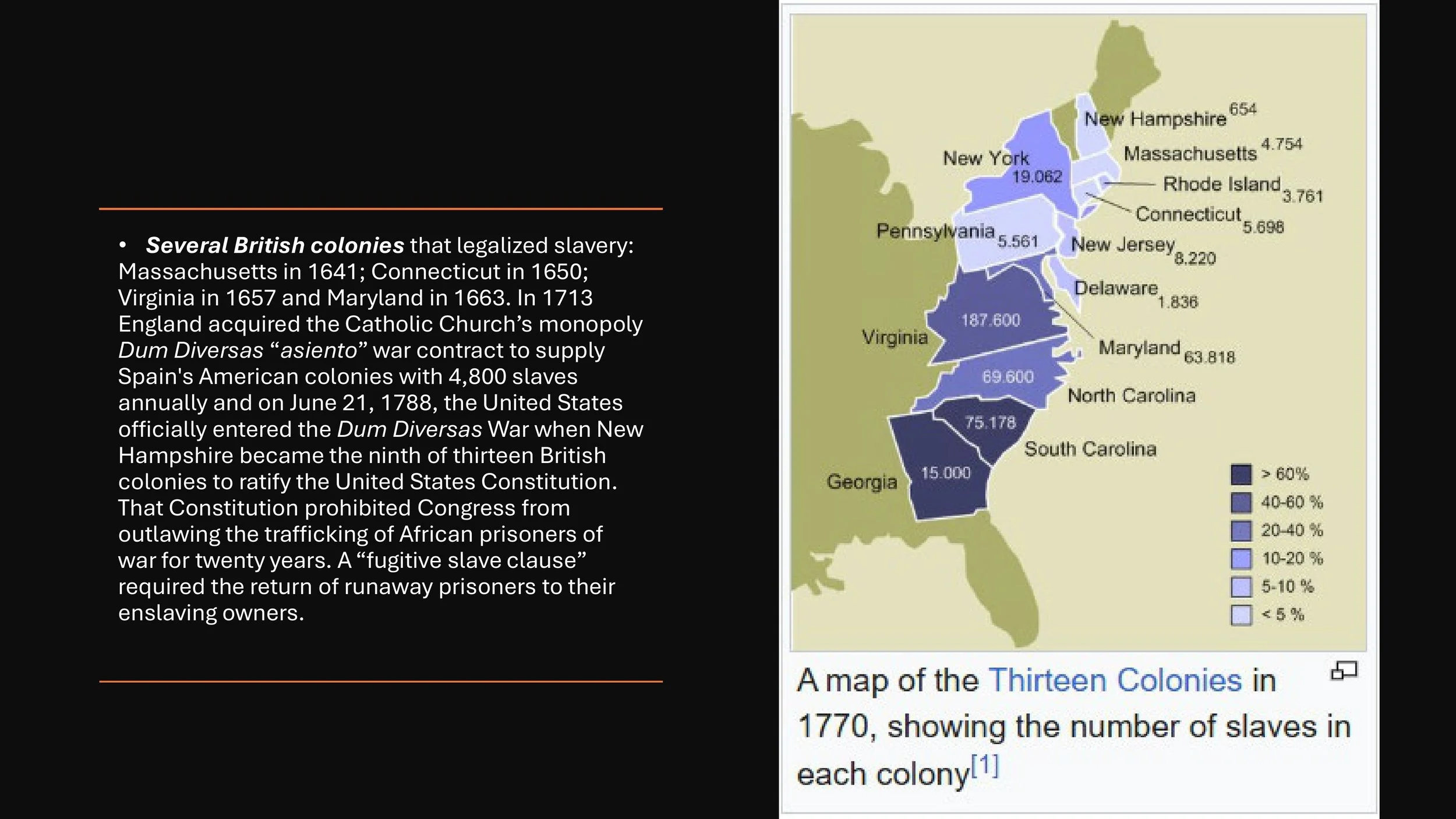








The day after the workshop began the 3rd Plenary Special Meeting of the Committee on Decolonization - C24.






Eliezer Benito Wheatley of the British Virgin Islands made the follwoing brilliant presentation:
Following Mr. Wheatlley, Russ Christopher of the U.S. Virgin Islands made his brilliant presentation:

















